
start-llms
A complete guide to start and improve your LLM skills in 2025 with little background in the field and stay up-to-date with the latest news and state-of-the-art techniques!
Stars: 789
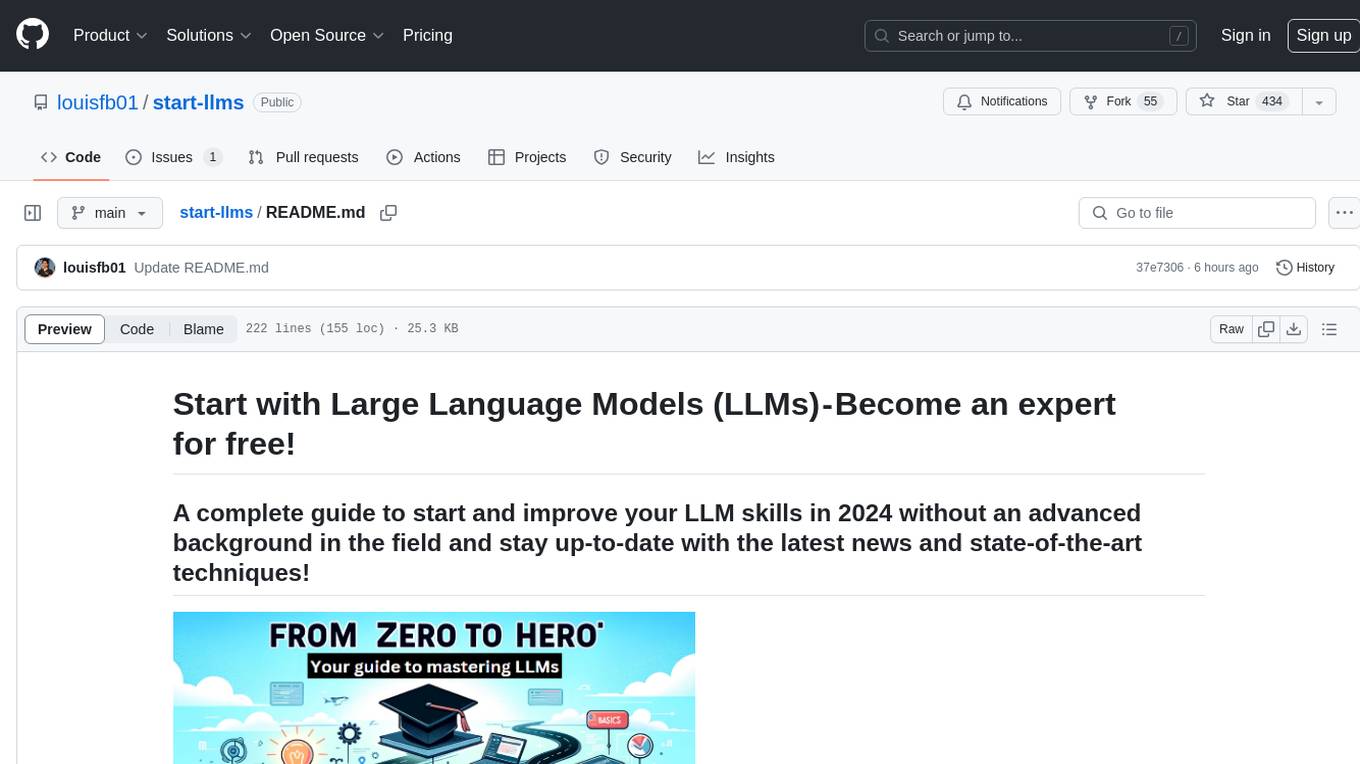
This repository is a comprehensive guide for individuals looking to start and improve their skills in Large Language Models (LLMs) without an advanced background in the field. It provides free resources, online courses, books, articles, and practical tips to become an expert in machine learning. The guide covers topics such as terminology, transformers, prompting, retrieval augmented generation (RAG), and more. It also includes recommendations for podcasts, YouTube videos, and communities to stay updated with the latest news in AI and LLMs.
README:
A complete guide to start and improve your LLM skills in 2025 without an advanced background in the field and stay up-to-date with the latest news and state-of-the-art techniques!
First, if you have 0 programming or AI knowledge, please follow this guide I made for this exact purpose and come back here!
This guide is intended for anyone with a small background in programming and machine learning. There is no specific order to follow, but a classic path would be from top to bottom. If you don't like reading books, skip them. If you don't want to follow an online course, you can also skip it. There is not a single way to become a machine learning expert, and with motivation, you can absolutely achieve it.
All resources listed here are free, except some online courses and books, which are certainly recommended for a better understanding, but it is definitely possible to become an expert without them, with a little more time spent on online readings, videos, and practice. When it comes to paying courses, the links in this guide are affiliated links. Please use them if you feel like following a course, as it will support me. Thank you, and have fun learning! Remember, this is completely up to you and not necessary. I felt like it was useful to me and maybe useful to others as well.
Don't be afraid to repeat videos or learn from multiple sources. Repetition is the key of success to learning!
Maintainer: louisfb01, also active on YouTube and as a Podcaster if you want to see/hear more about AI & LLMs! You can also learn more twice a week in my personal newsletter!
Feel free to submit an issue for any great resources to add to this repository.
Tag me on Twitter @Whats_AI or LinkedIn @Louis Bouchard if you share the list!
- Prerequesites
- Start with short YouTube video introductions as a first step
- LLM Books and articles (for readers)
- Follow online courses
- Practice, practice, and practice!
- Prompting
- Retrieval Augmented Generation (RAG)
- More resources (Communities, cheat sheets, news, and more!)
- How to find a machine learning job
- AI Ethics
- Learn more and do more... with LLMs
If you have 0 programming or AI knowledge, please follow this guide I made for this exact purpose. Check out the python section mostly and then you will have a strong enough background to come back here!
If you are somewhat familiar with Python and AI, then I wish you happy learning!
This is the best way to start from nothing. Here, I list a few of the best videos I found that will give you a great first introduction to the terms you need to know to get started in the LLM field.
- Understanding the terminology
- Mastering AI Jargon - Your Guide to OpenAI & LLM Terms - Louis Bouchard - A quick introduction to the most used terms in the LLM (or GPT) world.
- Understanding Transformers and LLMs (i.e. models behind ChatGPT)!
- Intro to Large Language Models - An amazing 1-hour talk from Andrej Karpathy.
- Natural Language Processing and Large Language Models - amazing video introductions to the attention mechanism, tokens, embeddings and more to better understand everything behind large language models like GPT by Luis Serrano.
- What are Transformer Models and how do they work? - Luis Serrano
- The Illustrated Word2vec - A Gentle Intro to Word Embeddings in Machine Learning - A clear explanation of word embeddings in machine learning by Jay Alammar.
- A Hackers' Guide to Language Models - by Jeremy Howard (fast.ai).
- Let's build GPT: from scratch, in code, spelled out. - by Andrej Karpathy.
Another easy way to get started and keep learning is by listening to podcasts in your spare time. Driving to work, on the bus, or having trouble falling asleep? Listen to some AI podcasts to get used to the terms and patterns, and learn about the field through inspiring stories! I invite you to follow a few of the best I personally prefer, like Lex Fridman, Machine Learning Street Talk, and obviously, my podcast: Louis Bouchard Podcast, where you will learn about incredibly talented people in the field with inspiring stories sharing the knowledge they worked so hard to gather. A new one I really enjoy listening to that keeps me up to date is the ThursdAI podcast by my friend Alex Volkov.
Here is a list of awesome courses available on YouTube that you should definitely follow and are 100% free.
- Louis Bouchard's LLM free course videos "Train & Fine-Tune LLMs for Production Course by Activeloop, Towards AI & Intel Disruptor". "A playlist for our LLM course: Gen AI 360: Foundational Model Certification!"
- Create a Large Language Model from Scratch with Python – Tutorial - by freeCodeCamp. "Learn how to build your own large language model, from scratch. This course goes into the data handling, math, and transformers behind large language models. You will use Python."
- LLM University (LLMU) from Cohere - by Cohere. LLM University (LLMU) is a set of comprehensive learning resources for anyone interested in natural language processing (NLP), from beginners to advanced learners.
- The Attention Mechanism in Large Language Models - by Luis Serrano. In this video series, Luis explains the Transformer architecture going increasingly in depth. It is a very good overview and explanation of Transformers and the attention mechanism that I believe should be watched by all AI professionals.
If you prefer the article and reading path, here are some suggestions:
- Building LLMs for Production: Enhancing LLM Abilities and Reliability with Prompting, Fine-Tuning, and RAG - by Towards AI. "Discover the key tech stacks for adapting Large Language Models to real-world applications, including Prompt Engineering, Fine-tuning, and Retrieval Augment Generation." (Or get the e-book here. You can DM me for a nice discount!)
- The LLM Engineer's Handbook—Build and refine LLMs step by step, covering data preparation, RAG, and fine-tuning.
- The Illustrated Transformer - by Jay Alammar. This is a famous article providing an amazing explanation to how current language models work.
- A Practical Introduction to LLMs - by Shawhin Talebi.
- Medium is pretty much the best place to find great explanations, either on Towards AI or Towards Data Science publications. I also share my own articles there and I love using the platform. You can subscribe to Medium using my affiliated link here if this sounds interesting to you and if you'd like to support me at the same time!
- Reading lists for new MILA students - Anonymous
- A complete roadmap to master NLP in 2022
- NLTK Book is the free resource to learn about fundamental theories behind NLP: https://www.nltk.org/book/
- The Annotated Transformer - Harvard
If you like some more guidance, I can advise checking out (optional) online courses, such as...
- Generative AI with Large Language Models - Paid
- Become an NLP pro with Coursera's Natural Language Processing Specialization by deeplearning.ai - Paid
- Gradio Course - Create User Interfaces for Machine Learning Models - freeCodeCamp - Free
- Train & Fine-Tune LLMs for Production Course by Activeloop, Towards AI & Intel Disruptor - Free
- The LLM University by Cohere - Free
- From Beginners to Advanced LLM Developer - by Towards AI. "Build Your First Scalable Product with LLMs, Prompting, RAG, Fine-Tuning, and Agents! Master the skills top companies need and build your own advanced LLM MVP with real-world applications."
- Become an NLP pro with Coursera's Natural Language Processing Specialization by deeplearning.ai - Paid "Break into the NLP space. Master cutting-edge NLP techniques through four hands-on courses!"
- An NLP Nano Degree! — Paid "Learn cutting-edge natural language processing techniques to process speech and analyze text. Build probabilistic and deep learning models, such as hidden Markov models and recurrent neural networks, to teach the computer to do tasks such as speech recognition, machine translation, and more!"
- Introduction to Large Language Models with Google Cloud - Paid
- Learn to train, fine-tune and use LLMs in your applications. - Free by Weights & Biases
- Large Language Models with Semantic Search - Free, Deeplearning.ai and Cohere
You can easily google for more, but after reading and watching those, I believe you already have a good enough understanding of LLMs to get into the real deal: practice.
The most important thing in programming is practice. This applies to machine learning too. It can be hard to find a personal project to practice. I strongly advise you to try to build something by yourself, but I understand it may be intimidating. What I would then suggest is to follow one or two extremely applied courses and use the resource to build your own project based on the code examples they provide you, and ChatGPT or GitHub Copilot to work for you as a code assistant for the rest of the work.
Here are a few of the most applied courses I could find for LLMs:
- Looking to build a quick text classification model or word vectorizer, fasttext is a good library to quickly train up a model.
- Huggingface is THE place to get modern day NLP models, and they also include a whole course about it.
- LangChain & Vector Databases in Production - An amazing free resource we built at Towards AI in partnership with Activeloop and the Intel Disruptor Initiative to learn about LangChain & Vector Databases in Production. "Whether you are an experienced developer who's a newcomer to the AI realm or an experienced machine learning enthusiast, this course is designed for you. Our goal is to make AI accessible and practical, transforming how you approach your daily tasks and the overall impact of your work."
- Training & Fine-Tuning LLMs for Production - An amazing free resource we built at Towards AI in partnership with Activeloop and the Intel Disruptor Initiative to learn about Training & Fine-Tuning LLMs for Production. "If you want to learn how to train and fine-tune LLMs from scratch and have intermediate Python knowledge as well as access to moderate compute resources (for some cases, just a Google Colab will suffice!), you should be all set to take and complete the course. This course is designed with a wide audience in mind, including beginners in AI, current machine learning engineers, students, and professionals considering a career transition to AI. We aim to provide you with the necessary tools to apply and tailor Large Language Models across a wide range of industries to make AI more accessible and practical."
- The Real-World ML Tutorial & Community - Paid
A reminder. The best way to learn is to build something! I really prone to learn by doing. Those courses are all great but optional. You can do it on your own, and most companies providing resources for working with LLMs (OpenAI, LangChain, Activeloop, Cohere, W&B...) have great tutorials to get you started and build something. Then, you can ask ChatGPT to help you finish it!
Prompting is an important new skill to learn for both using the models and building NLP-related apps.
- What is Prompting? Talking with AI Models... - Free
- ChatGPT Prompt Engineering for Developers - Paid
- Learn Prompting - This is a great free course intending to teach prompting and give tips for specific models. It is all you need for prompting!
- Techniques to improve reliability - OpenAI Cookbook on prompting techniques.
Most people build RAG-based apps currently. Here are a few resources that I loved to get you started and have a good understanding of it...
- A Survey of Techniques for Maximizing LLM Performance - Amazing video by OpenAI covering when to use prompt engineering, RAG or fine-tuning. This is a must-see for everyone in the field!
- RAG vs Fine-Tuning vs Deep Memory vs training LLM from Scratch: when to do what with LLMs - Simlarly, this is a short video covering when you should use RAG, fine-tuning or prompt engineering in your applications.
- Building a Q&A Chatbot using GPT and embeddings - Applied YouTube Tutorial by Jeremy Pinto.
- How to build an AI that can answer questions about your website - Free OpenAI tutorial.
- From Beginners to Advanced LLM Developer - by Towards AI. "Build Your First Scalable Product with LLMs, Prompting, RAG, Fine-Tuning, and Agents! Master the skills top companies need and build your own advanced LLM MVP with real-world applications."
- How to Build a RAG-based ChatGPT Web App: Meet Our new AI Tutor - YouTube introduction on how I built a RAG-based chatbot (and how you can, too).
- Training & Fine-Tuning LLMs for Production - Learn how to train and fine-tune LLMs from scratch.
- Train and Deploy a Real-Time Financial Advisor - Hands-on LLMs Course by Paul Iusztin, Pau Labarta Bajo and Alexandru Razvant.
- Retrieval Augmented Generation for Production with LangChain & LlamaIndex - Whether planning to build a chat with data application for your organization or just learning how to leverage Generative AI in various industries, this course is for you. The course addresses critical issues such as increasing retrieval accuracy, reducing hallucinations in AI outputs, enhancing explainability, addressing copyright concerns, and offering more tailored, up-to-date data inputs. We go beyond basic RAG applications, equipping you with the skills to create more complex, reliable products with tools like LangChain, LlamaIndex, and Deep Memory. Emphasizing hands-on learning, this course is a gateway to mastering advanced RAG techniques and applications in real-world scenarios.
- Building LLMs for Production: Enhancing LLM Abilities and Reliability with Prompting, Fine-Tuning, and RAG - by Towards AI. "Discover the key tech stacks for adapting Large Language Models to real-world applications, including Prompt Engineering, Fine-tuning, and Retrieval Augment Generation." (Or get the e-book here. You can DM me for a nice discount!)
-
A Discord server with many AI enthusiasts - Learn together, ask questions, find kaggle teammates, share your projects, and more.
-
A Discord server where you can stay up-to-date with the latest AI news - Stay up-to-date with the latest AI news, ask questions, share your projects, and much more.
-
Learn Prompting Discord community - Chat with fellow prompt engineers.
-
Follow reddit communities - Ask questions, share your projects, follow news, and more.
- artificial - Artificial Intelligence
- MachineLearning - Machine Learning (Biggest subreddit of the field)
- DeepLearningPapers - Deep Learning Papers
- ComputerVision - Extracting useful information from images and videos
- learnmachinelearning - Learn Machine Learning
- ArtificialInteligence - AI
- LatsestInML - Game-changing developments in machine learning you shouldn't miss
-
Subscribe to YouTube channels that share new papers - Stay up to date with the news in the field!
- Louis Bouchard - Weekly videos covering new papers
- Two Minutes Papers - Bi-weekly videos covering new papers
- Bycloud - Weekly videos covering new papers
-
LinkedIn Groups
- Artificial Intelligence, Machine Learning and Deep Learning News - News of the field shared by everyone in the group
- Artificial Intelligence | Deep Learning | Machine Learning
- Applied Artificial Intelligence
-
Facebook Groups
- Artificial Intelligence & Deep Learning - The definitive and most active FB Group on A.I., Neural Networks and Deep Learning. All things new and interesting on the frontier of A.I. and Deep Learning. Neural networks will redefine what it means to be a smart machine in the years to come.
- Deep learning - Nowadays society tends to be soft and automated evolving into the 4th industrial revolution, which consequently drives the constituents into the swirl of societal upheaval. To survive or take a lead one is supposed to be equipped with associated tools. Machine is becoming smarter and more intelligent. Machine learning is inescapable skill and it requires people to be familiar with. This group is for these people who are interest in the development of their talents to fit in.
-
Newsletters
- Synced AI TECHNOLOGY & INDUSTRY REVIEW - China's leading media & information provider for AI & Machine Learning.
- Inside AI - A daily roundup of stories and commentary on Artificial Intelligence, Robotics, and Neurotechnology.
- AI Weekly - A weekly collection of AI News and resources on Artificial Intelligence and Machine Learning.
- AI Ethics Weekly - The latest updates in AI Ethics delivered to your inbox every week.
- Louis Bouchard Weekly - One and only one paper clearly explained weekly with an article, video demo, demo, code, etc.
- ThursdAI - Recaps of the most high-signal AI weekly spaces!
- Toward's AI newsletter - Summarizing the most interesting news and learning resources weekly as well as community updates from the Learn AI Together Discord community. Perfect for ML professionals and enthusiasts.
- The Batch - Andrew Ng / Deeplearning.ai
-
Follow Medium publications
- Towards Data Science - "Sharing concepts, ideas, and codes"
- Towards AI - "The Best of Tech, Science, and Engineering."
- OneZero - "The undercurrents of the future. A Medium publication about tech and science."
- Read this section from the article full of interview tips and how to prepare for them.
- Learn how the interview process goes and getting better at preparing for them by watching how others did it, like the interview series I ran with experts from NVIDIA, Zoox (Self-driving company), D-ID (Generative AI Startup), etc.
- What are Ethics and Why do they Matter? Machine Learning Edition - by Rachel Thomas, founder of fast.ai
- AI4People—An Ethical Framework for a Good AI Society: Opportunities, Risks, Principles, and Recommendations - Floridi et al., 2018, AI4People AI for a good society
- Ethics guidelines for trustworthy AI - European Commission high-level expert group 7 points for a trustworthy AI.
- An Introduction to Ethics in Robotics and AI - a free e-book by Christoph Bartneck, Christoph Lütge, Alan Wagner, and Sean Welsh.
ChatGPT, Bing, Claude... are incredible. Of course, they have limitations. Yet, you can leverage those to learn anything you want. I use it for coding or asking lots of questions in general. You need to double-check when you ask for important questions. Still, it is a powerful tool. Yes, it is a tool, not a human replacement. Use it as a dumb assistant that knows about pretty much everything.
Here's a clear example of how I used it for a project to better understand a function from a project I was not familiar with. This is for python, but those models are extremely powerful for coding in general, understanding new platforms (like AWS, GCP, working with a virtual machine, a server, SSH connections, etc.... anything you are not familiar with that is useful in the LLM space).
p.s. I didn't mention Bing and Claude for fun. Don't be overly dependent on a single company like OpenAI. There are (and will always be) other companies in the fight for the best LLM. I wanted to create an example for the guide this morning when...
Tag me on Twitter @Whats_AI or LinkedIn @Louis Bouchard if you share the list!
👀 If you'd like to support my work, you can check to Sponsor this repository or support me on Patreon.
This guide is still regularly updated.
For Tasks:
Click tags to check more tools for each tasksFor Jobs:
Alternative AI tools for start-llms
Similar Open Source Tools

start-llms
This repository is a comprehensive guide for individuals looking to start and improve their skills in Large Language Models (LLMs) without an advanced background in the field. It provides free resources, online courses, books, articles, and practical tips to become an expert in machine learning. The guide covers topics such as terminology, transformers, prompting, retrieval augmented generation (RAG), and more. It also includes recommendations for podcasts, YouTube videos, and communities to stay updated with the latest news in AI and LLMs.
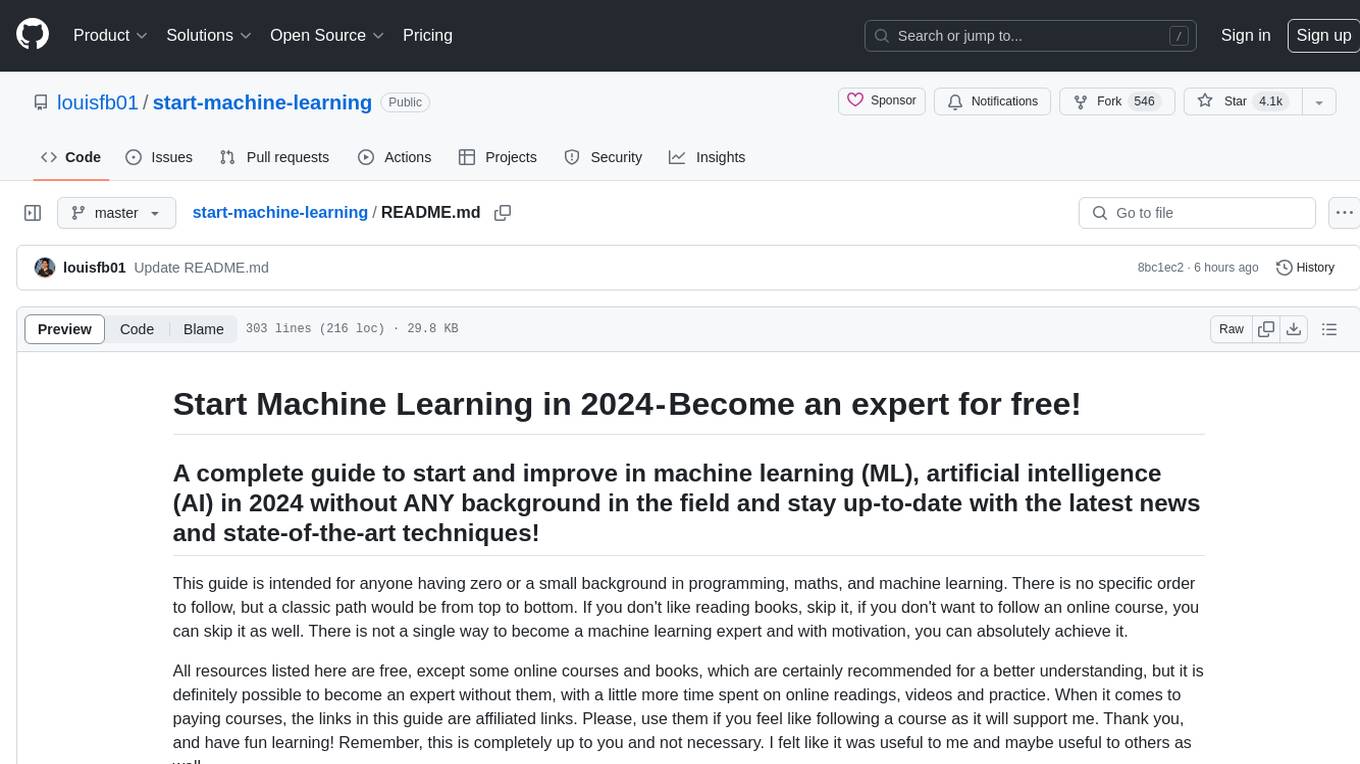
start-machine-learning
Start Machine Learning in 2024 is a comprehensive guide for beginners to advance in machine learning and artificial intelligence without any prior background. The guide covers various resources such as free online courses, articles, books, and practical tips to become an expert in the field. It emphasizes self-paced learning and provides recommendations for learning paths, including videos, podcasts, and online communities. The guide also includes information on building language models and applications, practicing through Kaggle competitions, and staying updated with the latest news and developments in AI. The goal is to empower individuals with the knowledge and resources to excel in machine learning and AI.
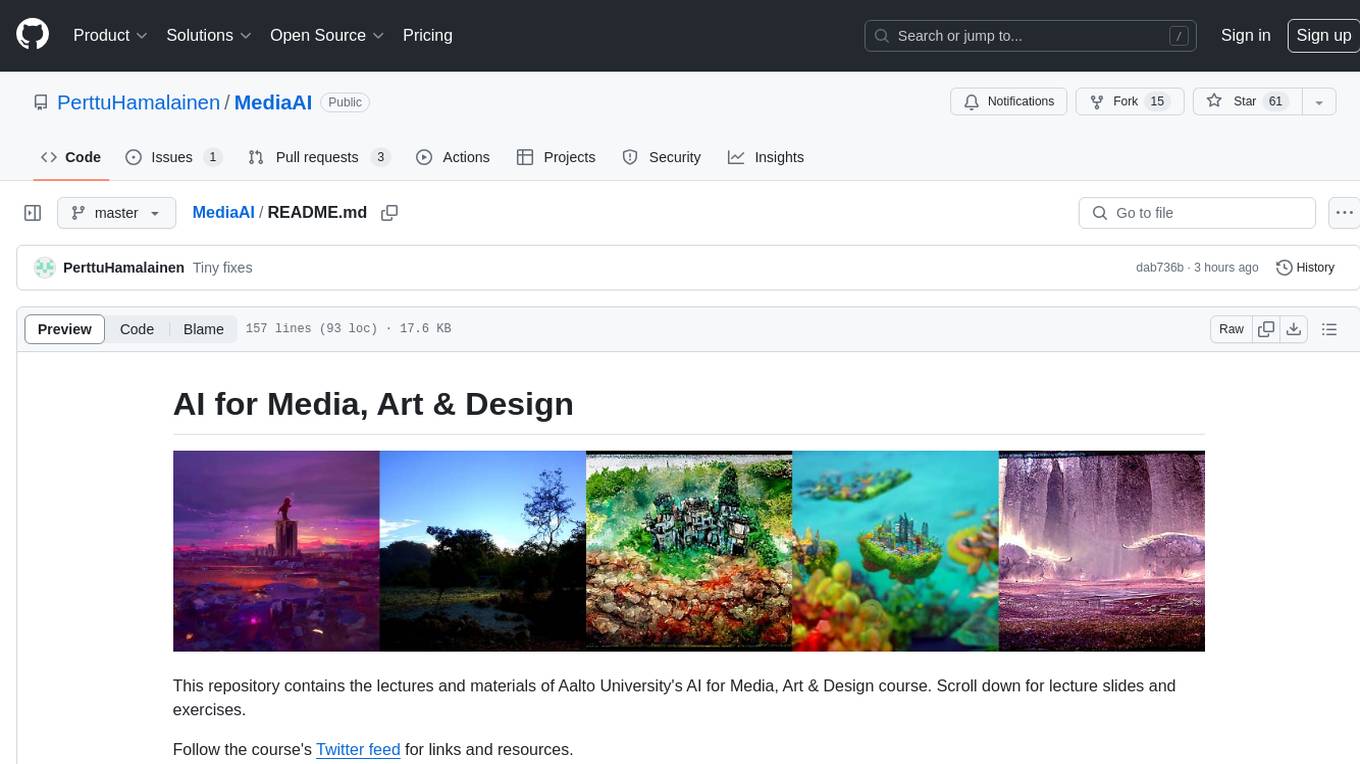
MediaAI
MediaAI is a repository containing lectures and materials for Aalto University's AI for Media, Art & Design course. The course is a hands-on, project-based crash course focusing on deep learning and AI techniques for artists and designers. It covers common AI algorithms & tools, their applications in art, media, and design, and provides hands-on practice in designing, implementing, and using these tools. The course includes lectures, exercises, and a final project based on students' interests. Students can complete the course without programming by creatively utilizing existing tools like ChatGPT and DALL-E. The course emphasizes collaboration, peer-to-peer tutoring, and project-based learning. It covers topics such as text generation, image generation, optimization, and game AI.
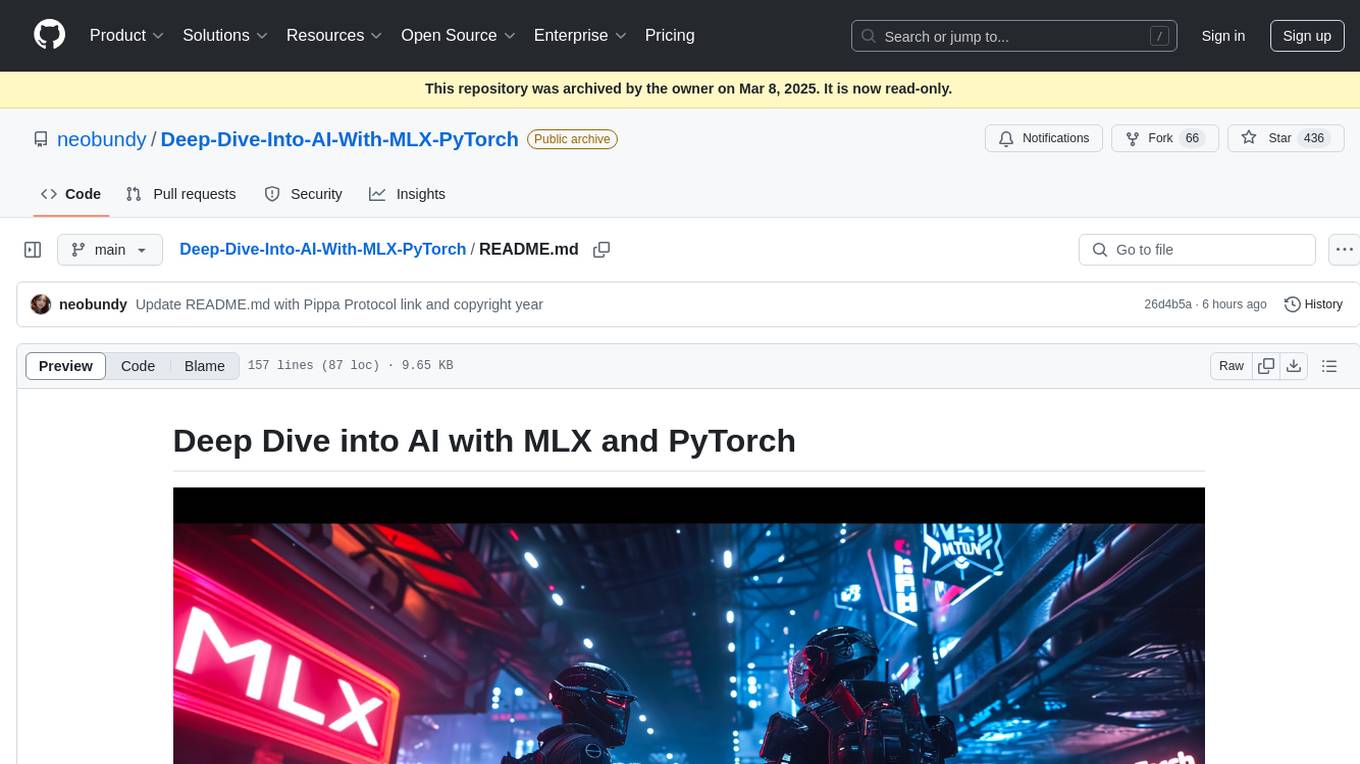
Deep-Dive-Into-AI-With-MLX-PyTorch
Deep Dive into AI with MLX and PyTorch is an educational initiative focusing on AI, machine learning, and deep learning using Apple's MLX and Meta's PyTorch frameworks. The repository contains comprehensive guides, in-depth analyses, and resources for learning and exploring AI concepts. It aims to cater to audiences ranging from beginners to experienced individuals, providing detailed explanations, examples, and translations between PyTorch and MLX. The project emphasizes open-source contributions, knowledge sharing, and continuous learning in the field of AI.
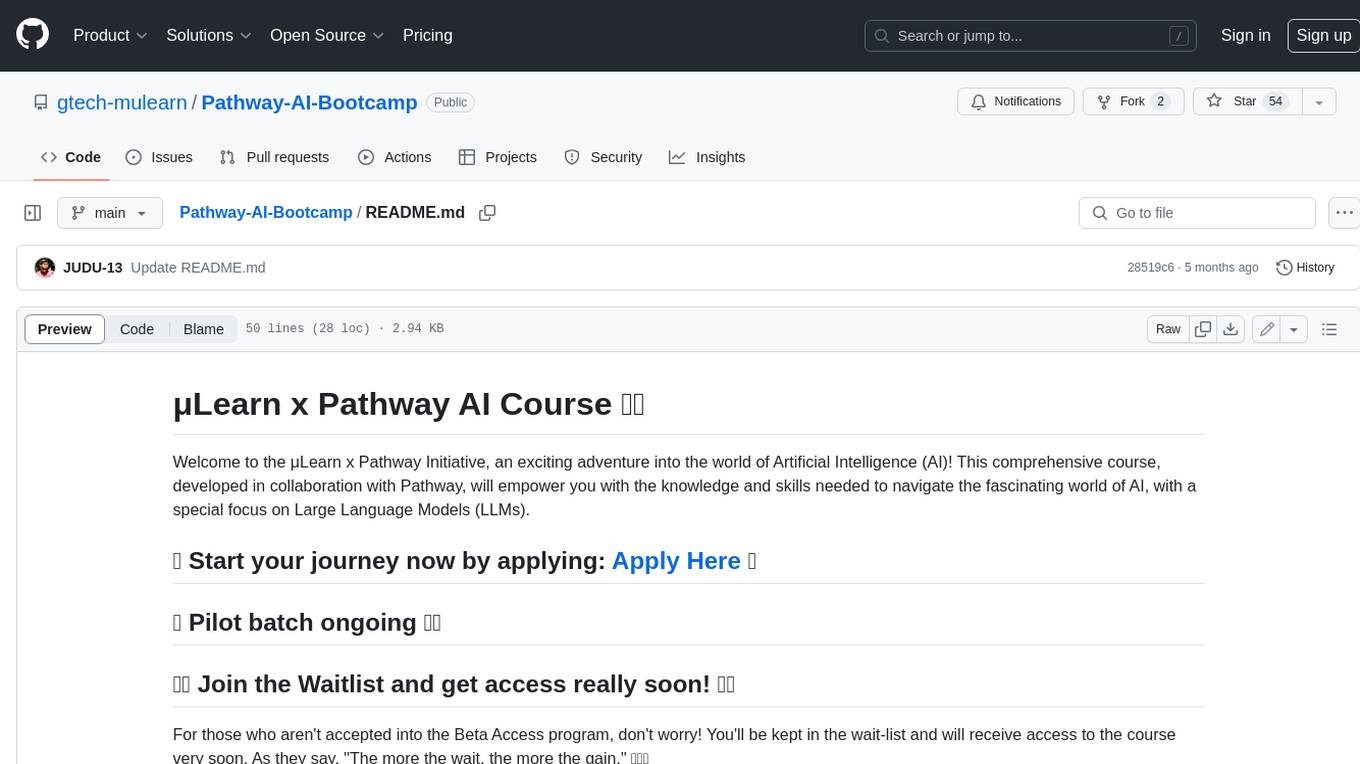
Pathway-AI-Bootcamp
Welcome to the μLearn x Pathway Initiative, an exciting adventure into the world of Artificial Intelligence (AI)! This comprehensive course, developed in collaboration with Pathway, will empower you with the knowledge and skills needed to navigate the fascinating world of AI, with a special focus on Large Language Models (LLMs).
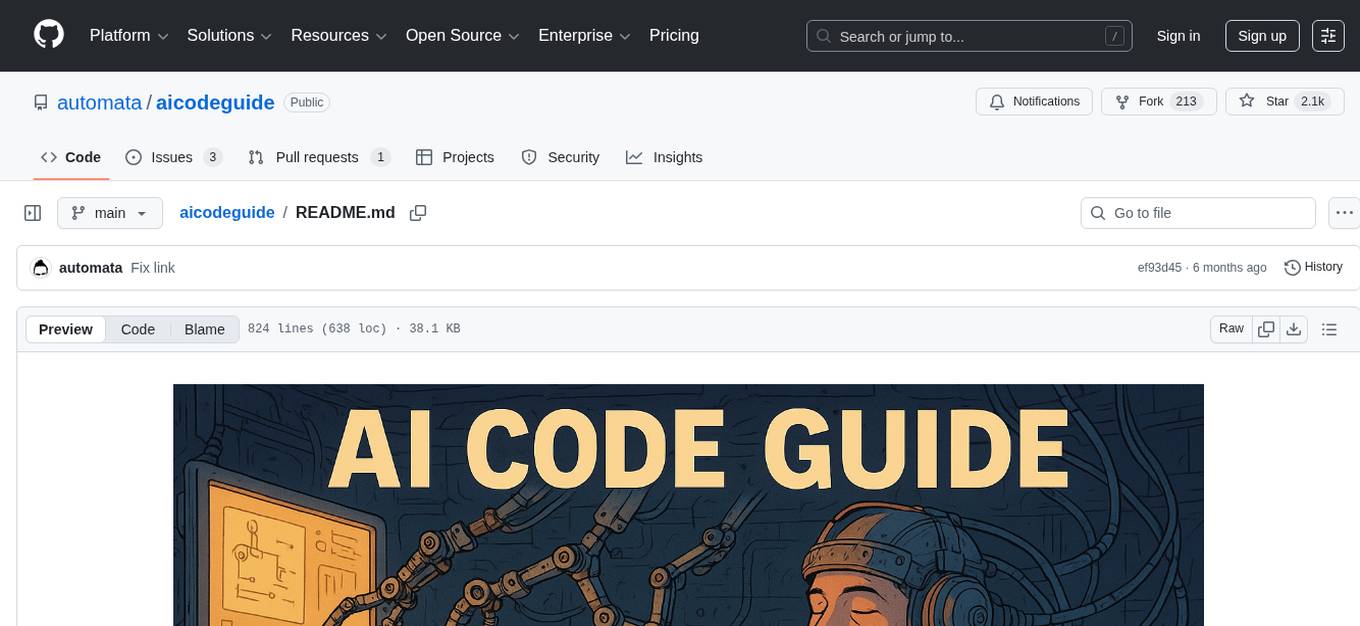
aicodeguide
AI Code Guide is a comprehensive guide that covers everything you need to know about using AI to help you code or even code for you. It provides insights into the changing landscape of coding with AI, new tools, editors, and practices. The guide aims to consolidate information on AI coding and AI-assisted code generation in one accessible place. It caters to both experienced coders looking to leverage AI tools and beginners interested in 'vibe coding' to build software products. The guide covers various topics such as AI coding practices, different ways to use AI in coding, recommended resources, tools for AI coding, best practices for structuring prompts, and tips for using specific tools like Claude Code.
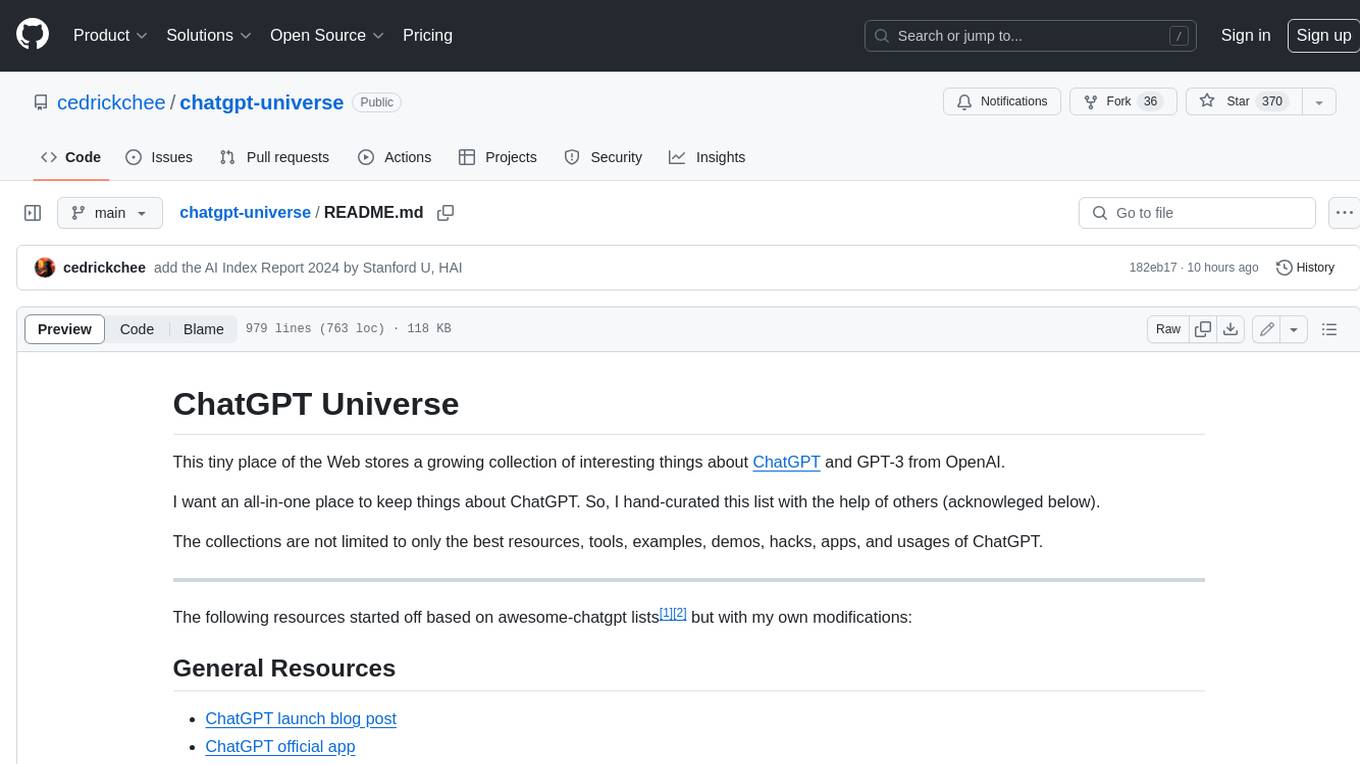
chatgpt-universe
ChatGPT is a large language model that can generate human-like text, translate languages, write different kinds of creative content, and answer your questions in a conversational way. It is trained on a massive amount of text data, and it is able to understand and respond to a wide range of natural language prompts. Here are 5 jobs suitable for this tool, in lowercase letters: 1. content writer 2. chatbot assistant 3. language translator 4. creative writer 5. researcher
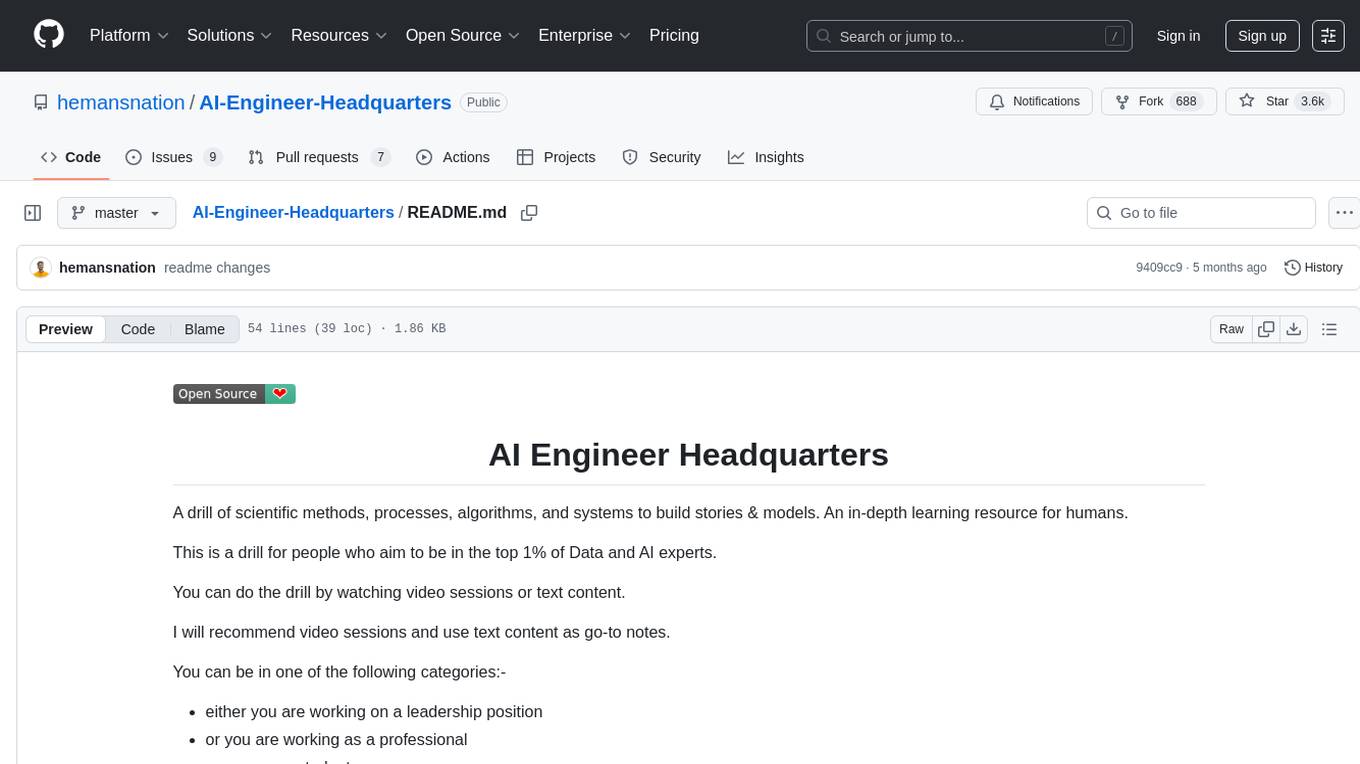
AI-Engineer-Headquarters
AI Engineer Headquarters is a comprehensive learning resource designed to help individuals master scientific methods, processes, algorithms, and systems to build stories and models in the field of Data and AI. The repository provides in-depth content through video sessions and text materials, catering to individuals aspiring to be in the top 1% of Data and AI experts. It covers various topics such as AI engineering foundations, large language models, retrieval-augmented generation, fine-tuning LLMs, reinforcement learning, ethical AI, agentic workflows, and career acceleration. The learning approach emphasizes action-oriented drills and routines, encouraging consistent effort and dedication to excel in the AI field.
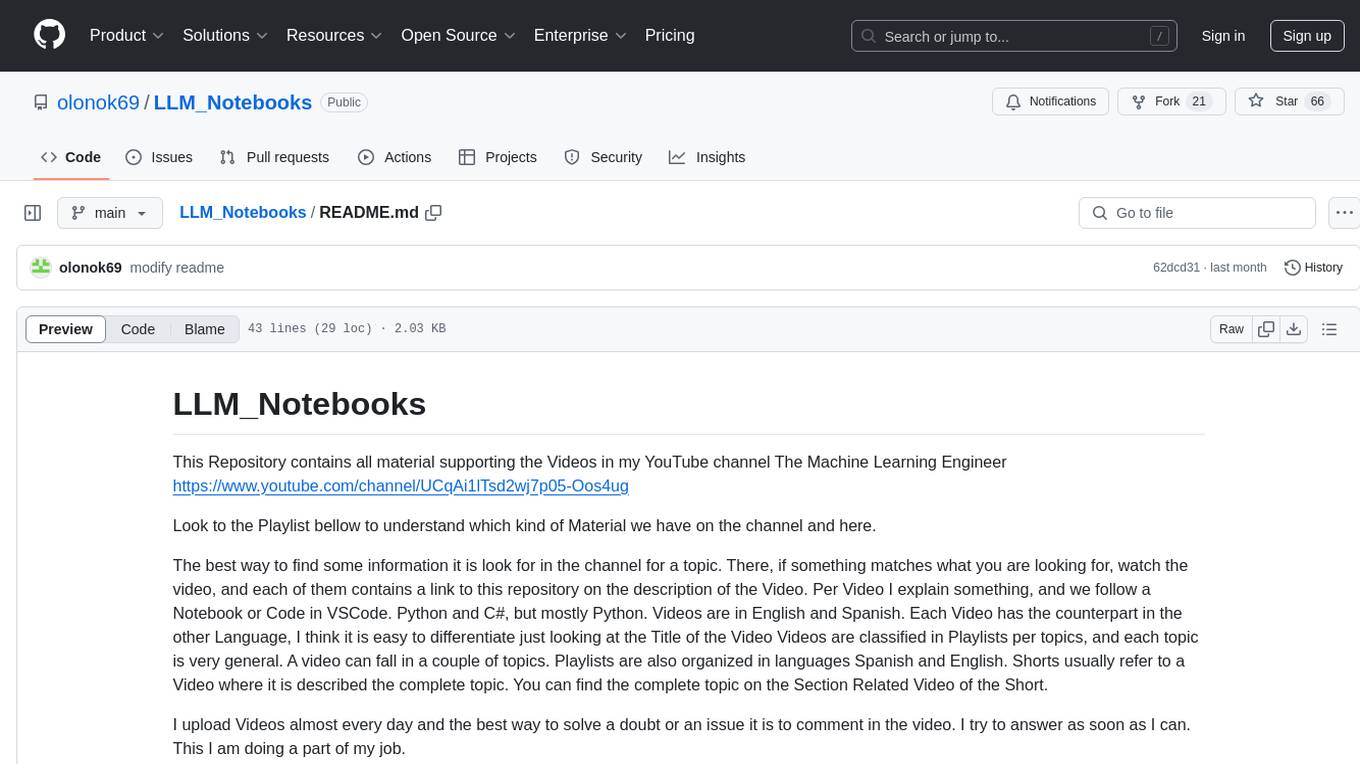
LLM_Notebooks
LLM_Notebooks is a repository supporting The Machine Learning Engineer YouTube channel. It contains materials related to various topics such as Generative AI, MLOps, ML projects, Azure Projects, Google VertexAi, ML Tricks, and more. The repository includes notebooks and code in Python and C#, with a focus on Python. The videos on the channel cover a wide range of topics in English and Spanish, organized into playlists based on general themes. The repository links are provided in the video descriptions for easy access. The creator uploads videos regularly and encourages viewers to subscribe, like, and leave constructive comments. The repository serves as a valuable resource for learning and exploring machine learning concepts and tools.
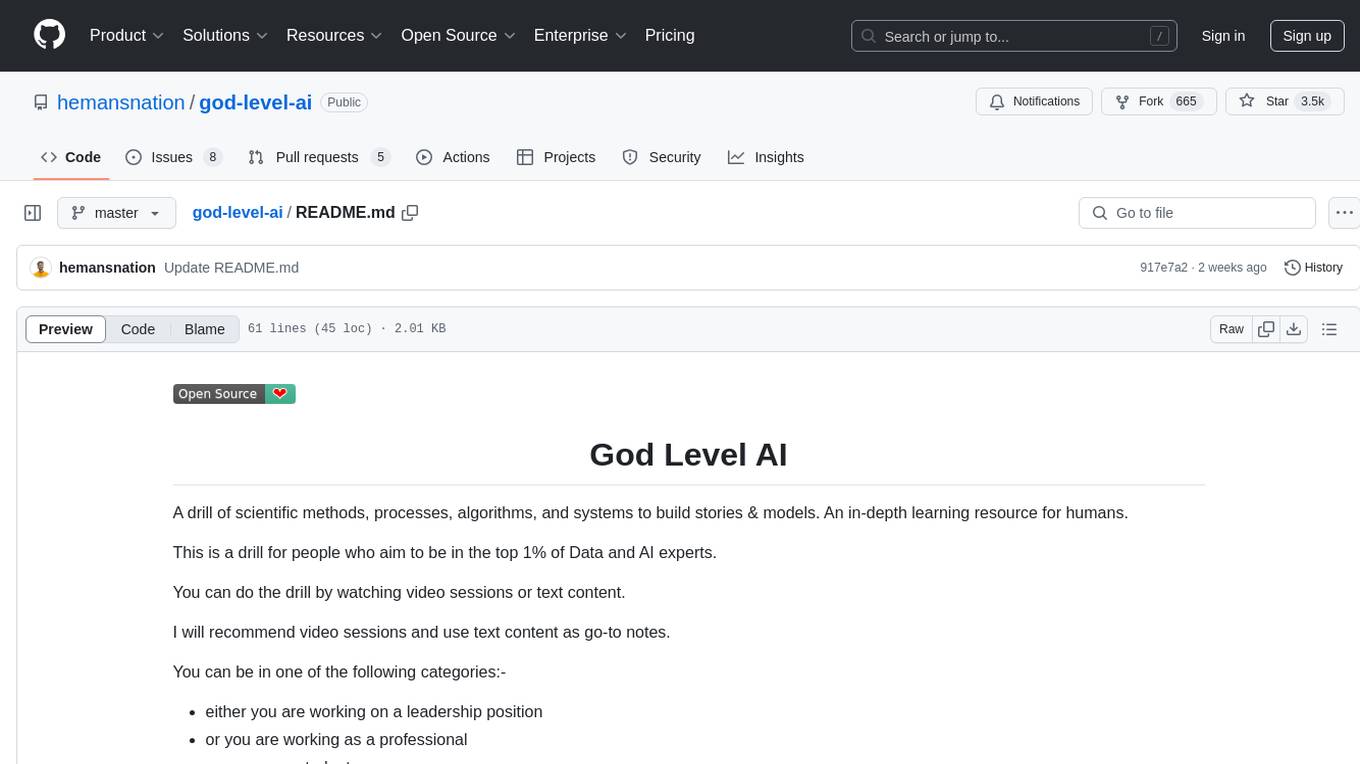
god-level-ai
A drill of scientific methods, processes, algorithms, and systems to build stories & models. An in-depth learning resource for humans. This is a drill for people who aim to be in the top 1% of Data and AI experts. The repository provides a routine for deep and shallow work sessions, covering topics from Python to AI/ML System Design and Personal Branding & Portfolio. It emphasizes the importance of continuous effort and action in the tech field.

local-chat
LocalChat is a simple, easy-to-set-up, and open-source local AI chat tool that allows users to interact with generative language models on their own computers without transmitting data to a cloud server. It provides a chat-like interface for users to experience ChatGPT-like behavior locally, ensuring GDPR compliance and data privacy. Users can download LocalChat for macOS, Windows, or Linux to chat with open-weight generative language models.
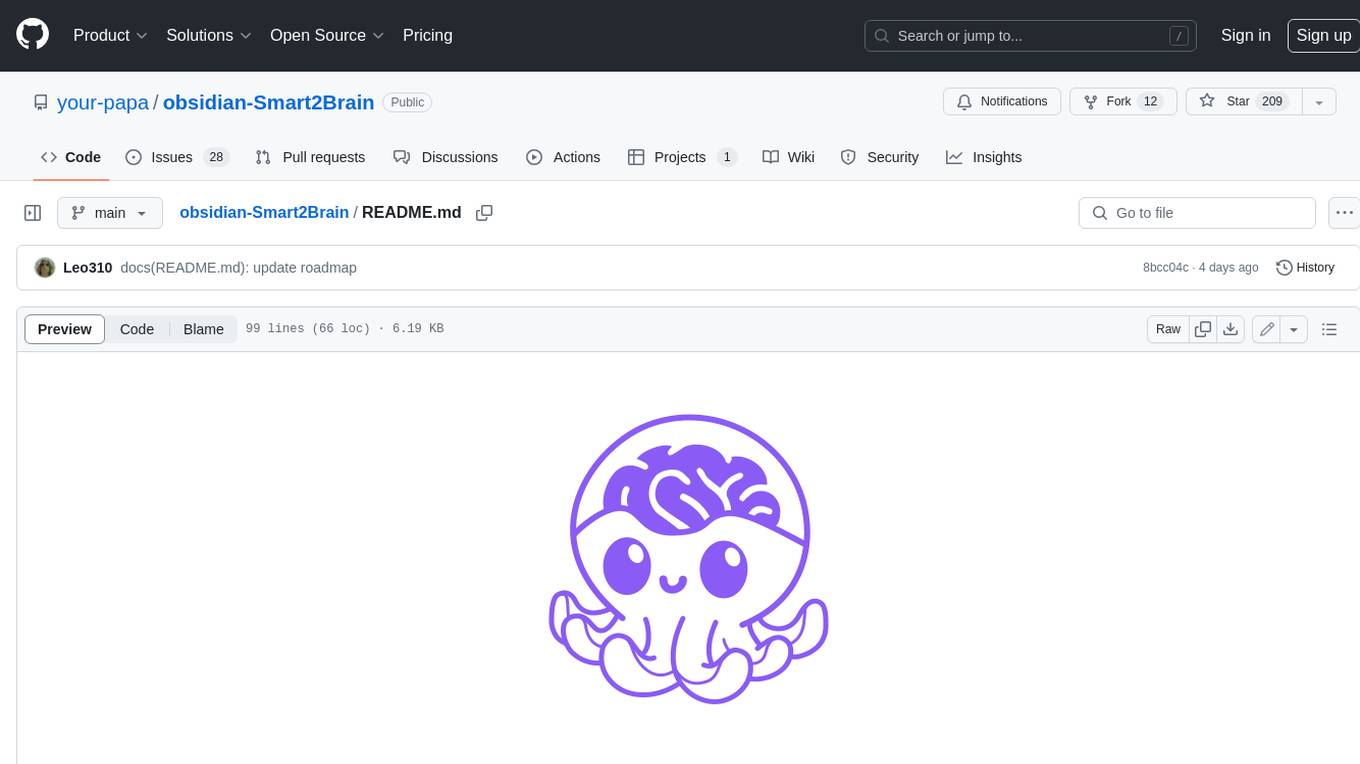
obsidian-Smart2Brain
Your Smart Second Brain is a free and open-source Obsidian plugin that serves as your personal assistant, powered by large language models like ChatGPT or Llama2. It can directly access and process your notes, eliminating the need for manual prompt editing, and it can operate completely offline, ensuring your data remains private and secure.
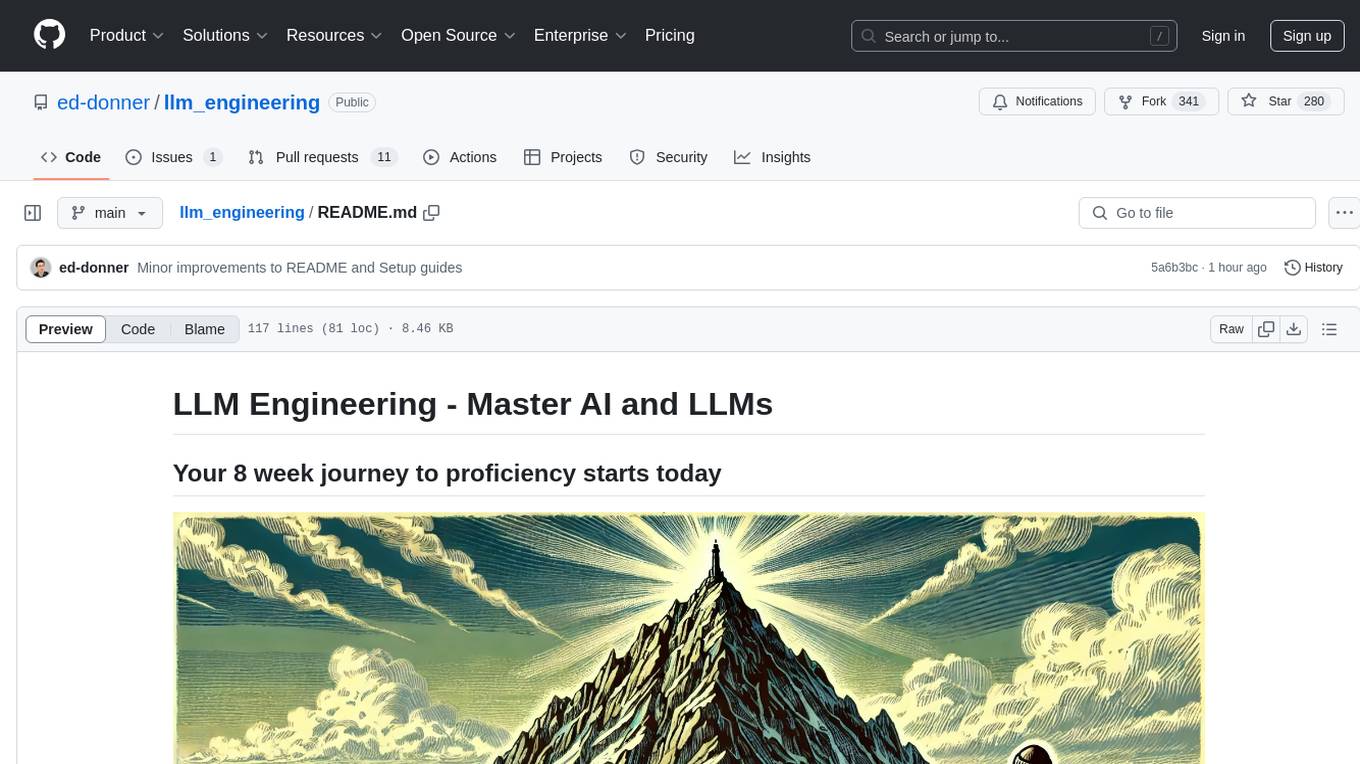
llm_engineering
LLM Engineering is an 8-week course designed to help learners master AI and LLMs through a series of projects that gradually increase in complexity. The course covers setting up the environment, working with APIs, using Google Colab for GPU processing, and building an autonomous Agentic AI solution. Learners are encouraged to actively participate, run code cells, tweak code, and share their progress with the community. The emphasis is on practical, educational projects that teach valuable business skills.
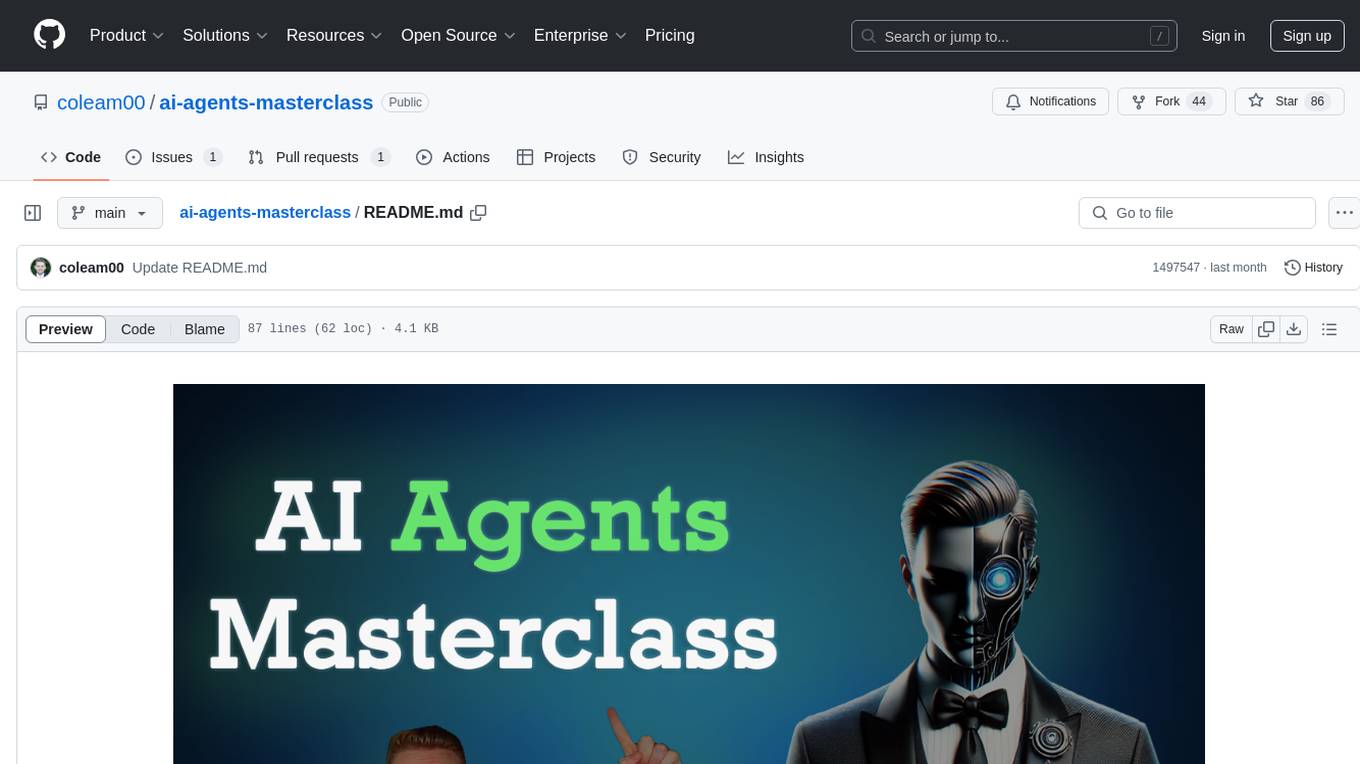
ai-agents-masterclass
AI Agents Masterclass is a repository dedicated to teaching developers how to use AI agents to transform businesses and create powerful software. It provides weekly videos with accompanying code folders, guiding users on setting up Python environments, using environment variables, and installing necessary packages to run the code. The focus is on Large Language Models that can interact with the outside world to perform tasks like drafting emails, booking appointments, and managing tasks, enabling users to create innovative applications with minimal coding effort.
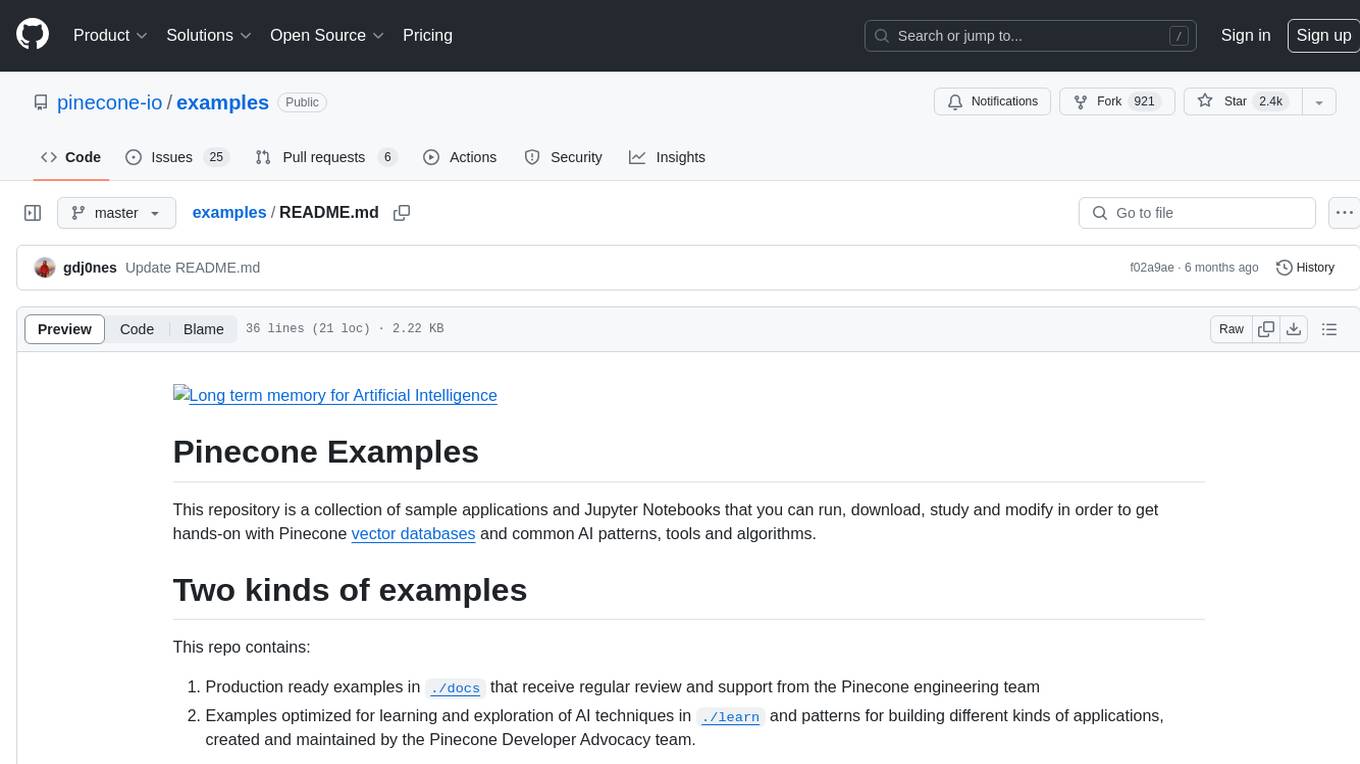
examples
This repository contains a collection of sample applications and Jupyter Notebooks for hands-on experience with Pinecone vector databases and common AI patterns, tools, and algorithms. It includes production-ready examples for review and support, as well as learning-optimized examples for exploring AI techniques and building applications. Users can contribute, provide feedback, and collaborate to improve the resource.
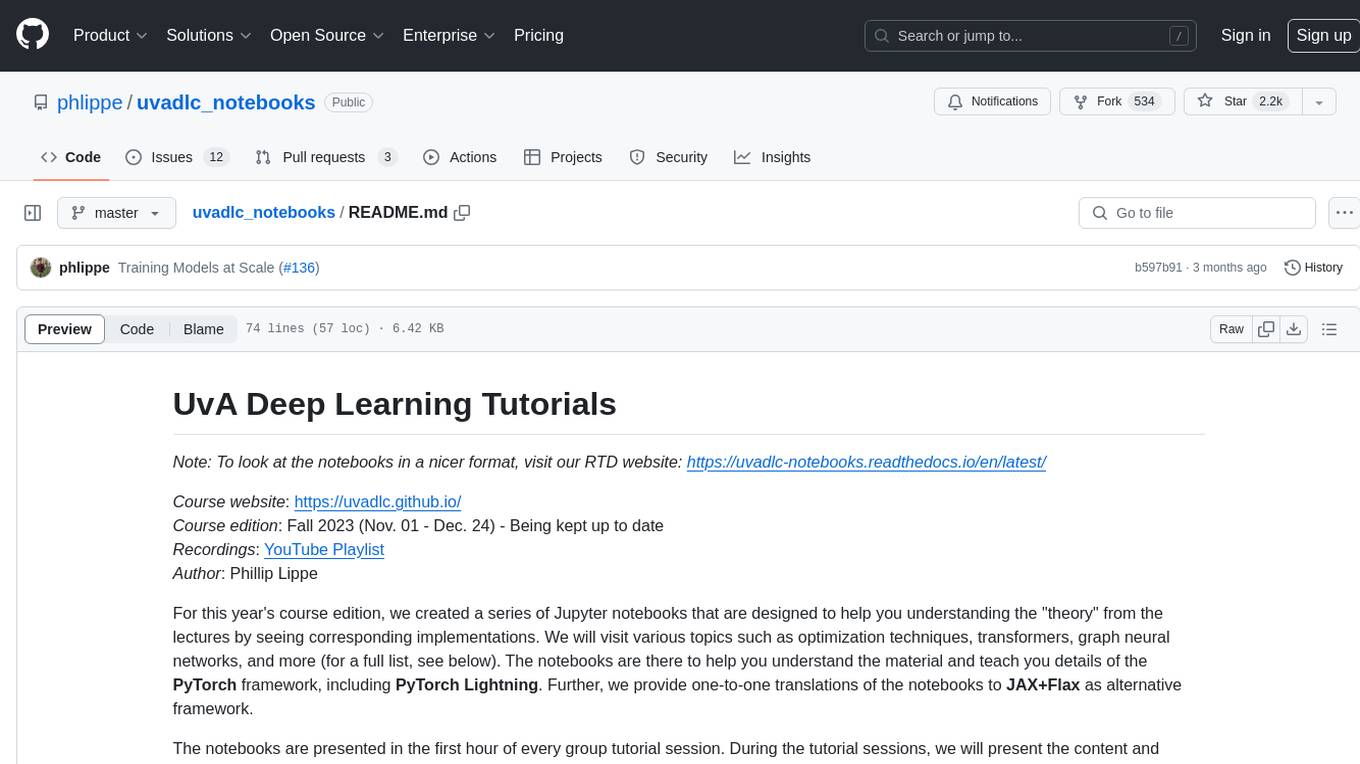
uvadlc_notebooks
The UvA Deep Learning Tutorials repository contains a series of Jupyter notebooks designed to help understand theoretical concepts from lectures by providing corresponding implementations. The notebooks cover topics such as optimization techniques, transformers, graph neural networks, and more. They aim to teach details of the PyTorch framework, including PyTorch Lightning, with alternative translations to JAX+Flax. The tutorials are integrated as official tutorials of PyTorch Lightning and are relevant for graded assignments and exams.
For similar tasks

start-llms
This repository is a comprehensive guide for individuals looking to start and improve their skills in Large Language Models (LLMs) without an advanced background in the field. It provides free resources, online courses, books, articles, and practical tips to become an expert in machine learning. The guide covers topics such as terminology, transformers, prompting, retrieval augmented generation (RAG), and more. It also includes recommendations for podcasts, YouTube videos, and communities to stay updated with the latest news in AI and LLMs.

start-machine-learning
Start Machine Learning in 2024 is a comprehensive guide for beginners to advance in machine learning and artificial intelligence without any prior background. The guide covers various resources such as free online courses, articles, books, and practical tips to become an expert in the field. It emphasizes self-paced learning and provides recommendations for learning paths, including videos, podcasts, and online communities. The guide also includes information on building language models and applications, practicing through Kaggle competitions, and staying updated with the latest news and developments in AI. The goal is to empower individuals with the knowledge and resources to excel in machine learning and AI.
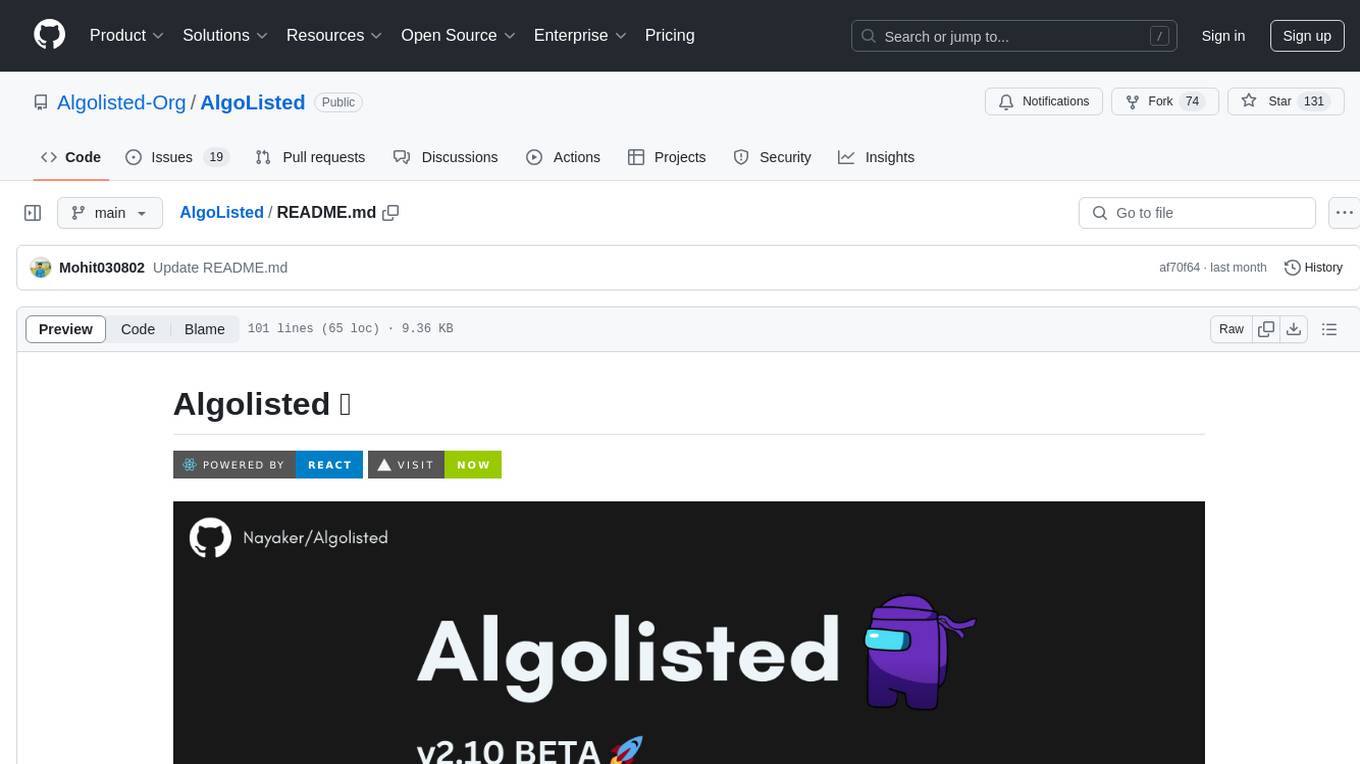
AlgoListed
Algolisted is a pioneering platform dedicated to algorithmic problem-solving, offering a centralized hub for a diverse array of algorithmic challenges. It provides an immersive online environment for programmers to enhance their skills through Data Structures and Algorithms (DSA) sheets, academic progress tracking, resume refinement with OpenAI integration, adaptive testing, and job opportunity listings. The project is built on the MERN stack, Flask, Beautiful Soup, and Selenium,GEN AI, and deployed on Firebase. Algolisted aims to be a reliable companion in the pursuit of coding knowledge and proficiency.

xlings
Xlings is a developer tool for programming learning, development, and course building. It provides features such as software installation, one-click environment setup, project dependency management, and cross-platform language package management. Additionally, it offers real-time compilation and running, AI code suggestions, tutorial project creation, automatic code checking for practice, and demo examples collection.
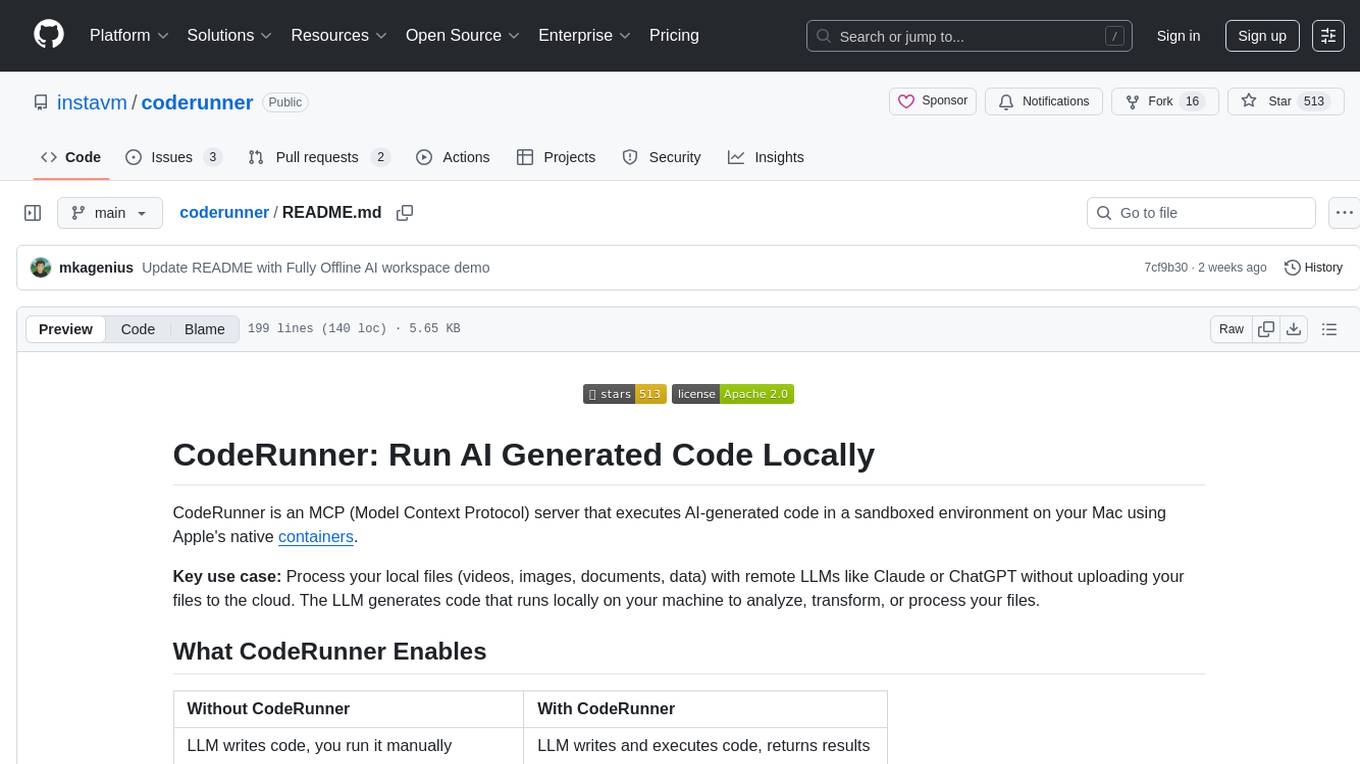
coderunner
Coderunner is a versatile tool designed for running code snippets in various programming languages. It provides an interactive environment for testing and debugging code without the need for a full-fledged IDE. With support for multiple languages and quick execution times, Coderunner is ideal for beginners learning to code, experienced developers prototyping algorithms, educators creating coding exercises, interview candidates practicing coding challenges, and professionals testing small code snippets.
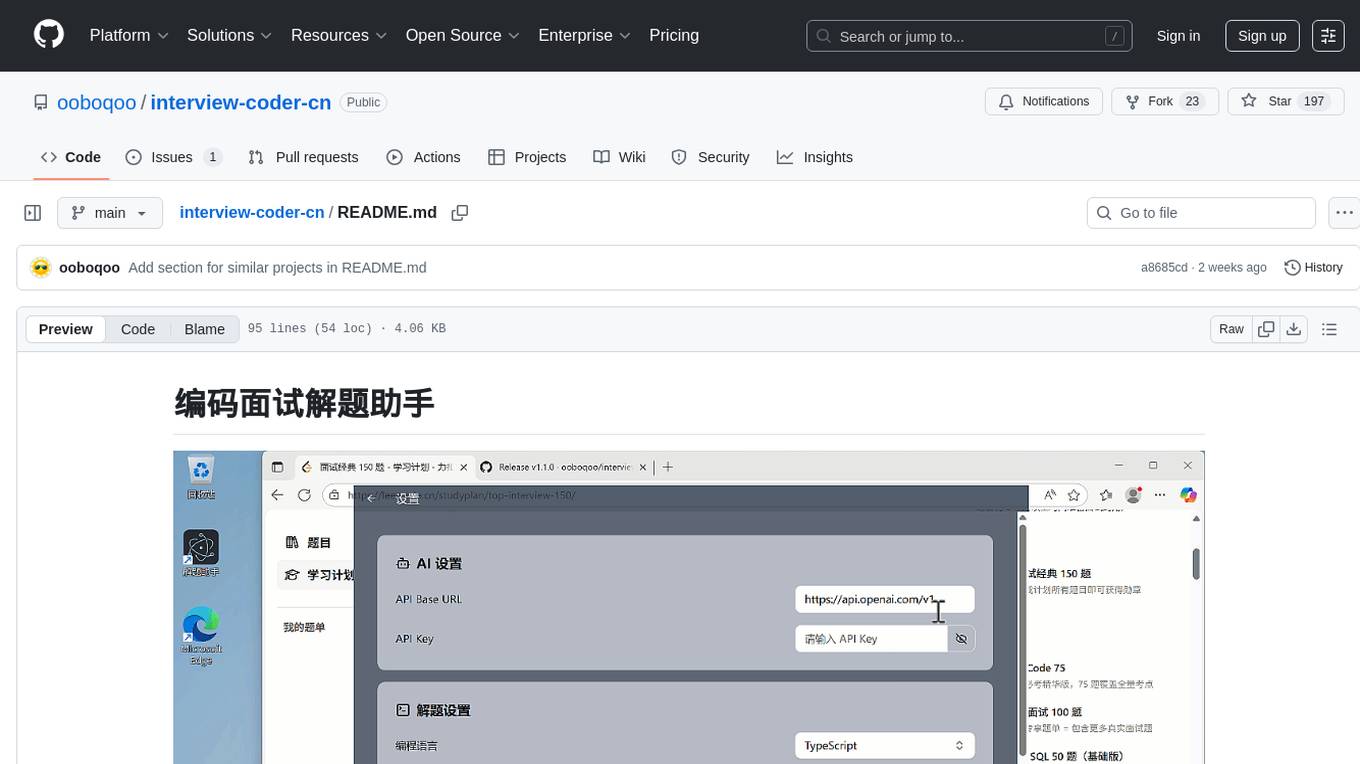
interview-coder-cn
This is a coding problem-solving assistant for Chinese users, tailored to the domestic AI ecosystem, simple and easy to use. It provides real-time problem-solving ideas and code analysis for coding interviews, avoiding detection during screen sharing. Users can also extend its functionality for other scenarios by customizing prompt words. The tool supports various programming languages and has stealth capabilities to hide its interface from interviewers even when screen sharing.
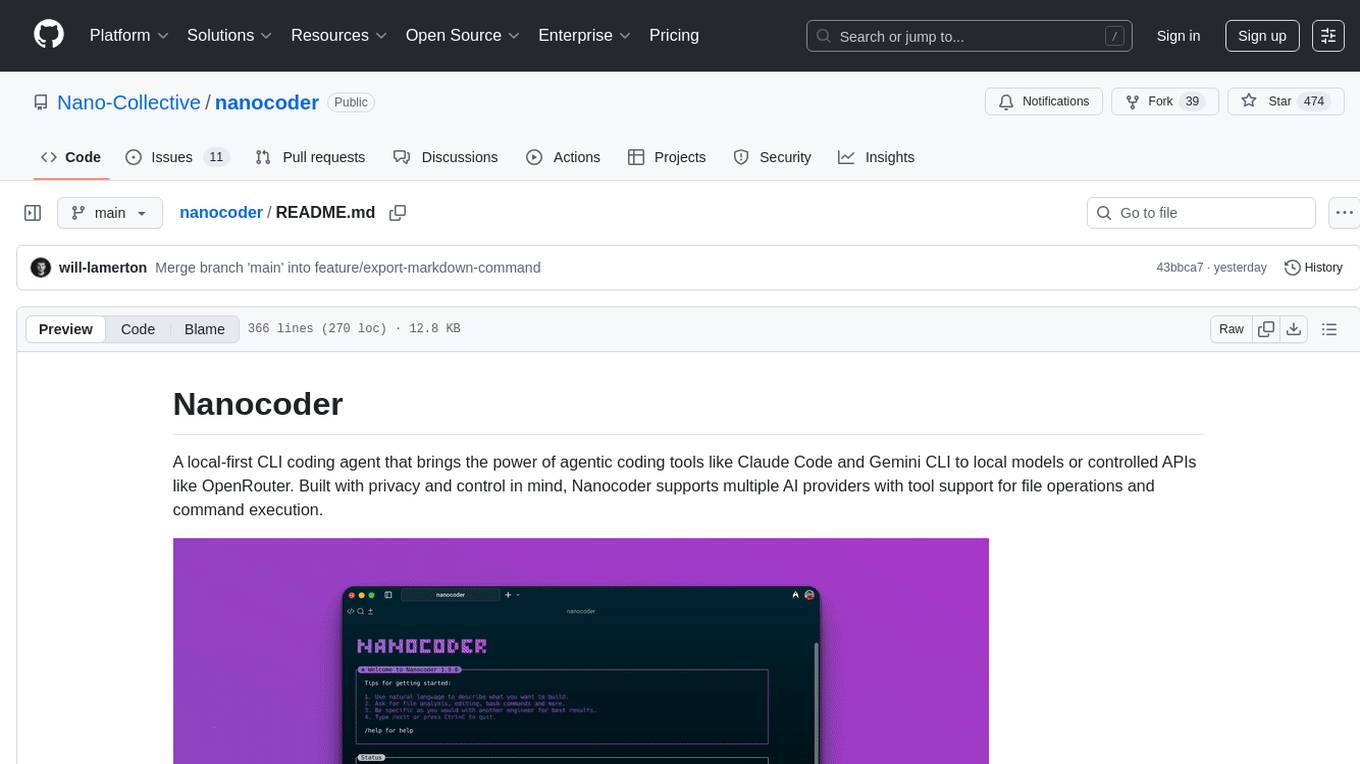
nanocoder
Nanocoder is a versatile code editor designed for beginners and experienced programmers alike. It provides a user-friendly interface with features such as syntax highlighting, code completion, and error checking. With Nanocoder, you can easily write and debug code in various programming languages, making it an ideal tool for learning, practicing, and developing software projects. Whether you are a student, hobbyist, or professional developer, Nanocoder offers a seamless coding experience to boost your productivity and creativity.
For similar jobs
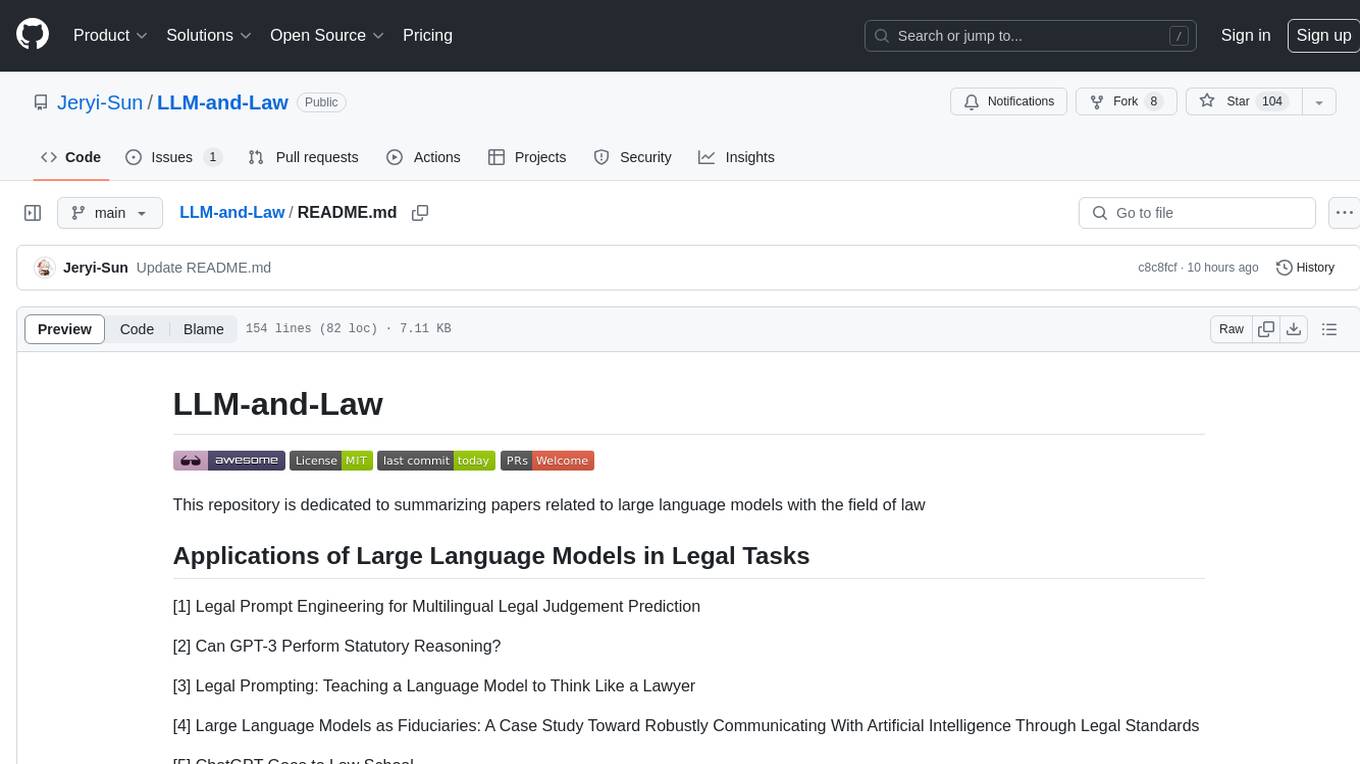
LLM-and-Law
This repository is dedicated to summarizing papers related to large language models with the field of law. It includes applications of large language models in legal tasks, legal agents, legal problems of large language models, data resources for large language models in law, law LLMs, and evaluation of large language models in the legal domain.

start-llms
This repository is a comprehensive guide for individuals looking to start and improve their skills in Large Language Models (LLMs) without an advanced background in the field. It provides free resources, online courses, books, articles, and practical tips to become an expert in machine learning. The guide covers topics such as terminology, transformers, prompting, retrieval augmented generation (RAG), and more. It also includes recommendations for podcasts, YouTube videos, and communities to stay updated with the latest news in AI and LLMs.
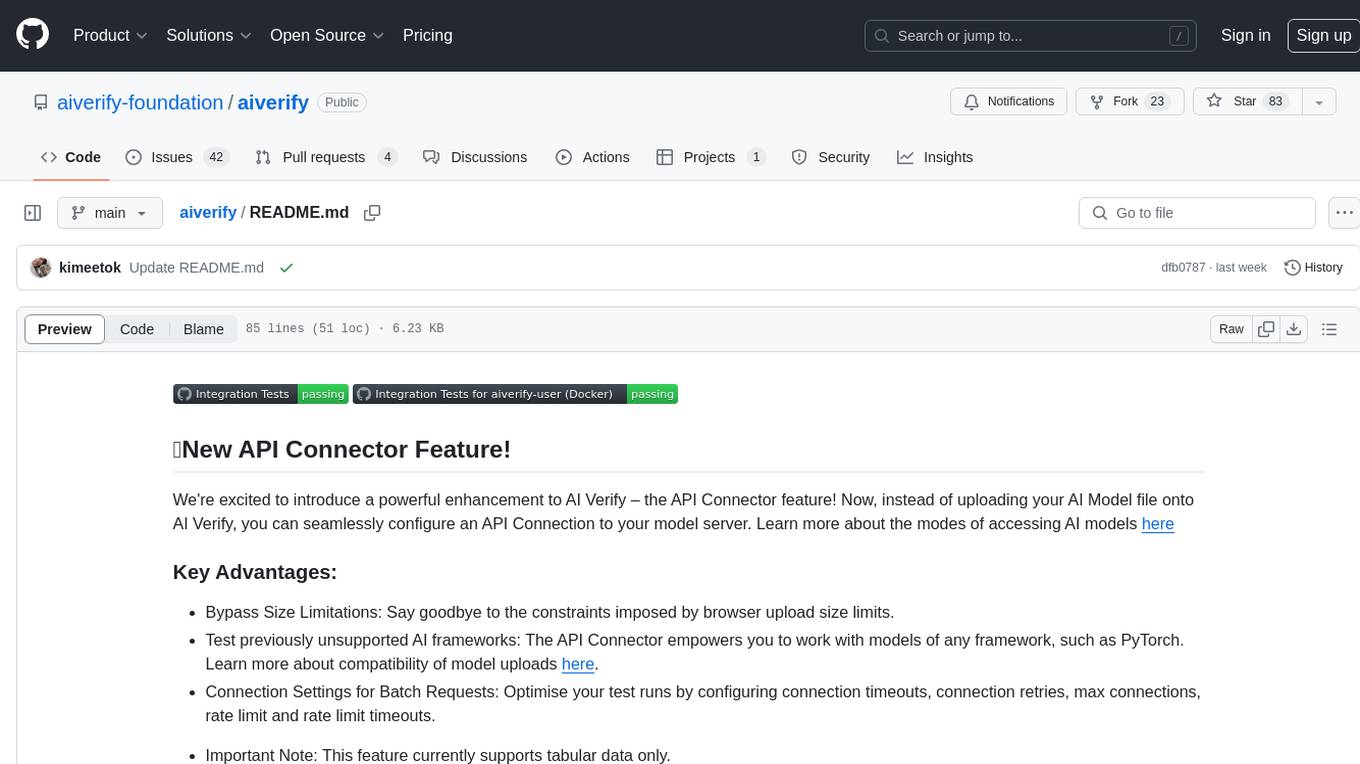
aiverify
AI Verify is an AI governance testing framework and software toolkit that validates the performance of AI systems against internationally recognised principles through standardised tests. It offers a new API Connector feature to bypass size limitations, test various AI frameworks, and configure connection settings for batch requests. The toolkit operates within an enterprise environment, conducting technical tests on common supervised learning models for tabular and image datasets. It does not define AI ethical standards or guarantee complete safety from risks or biases.
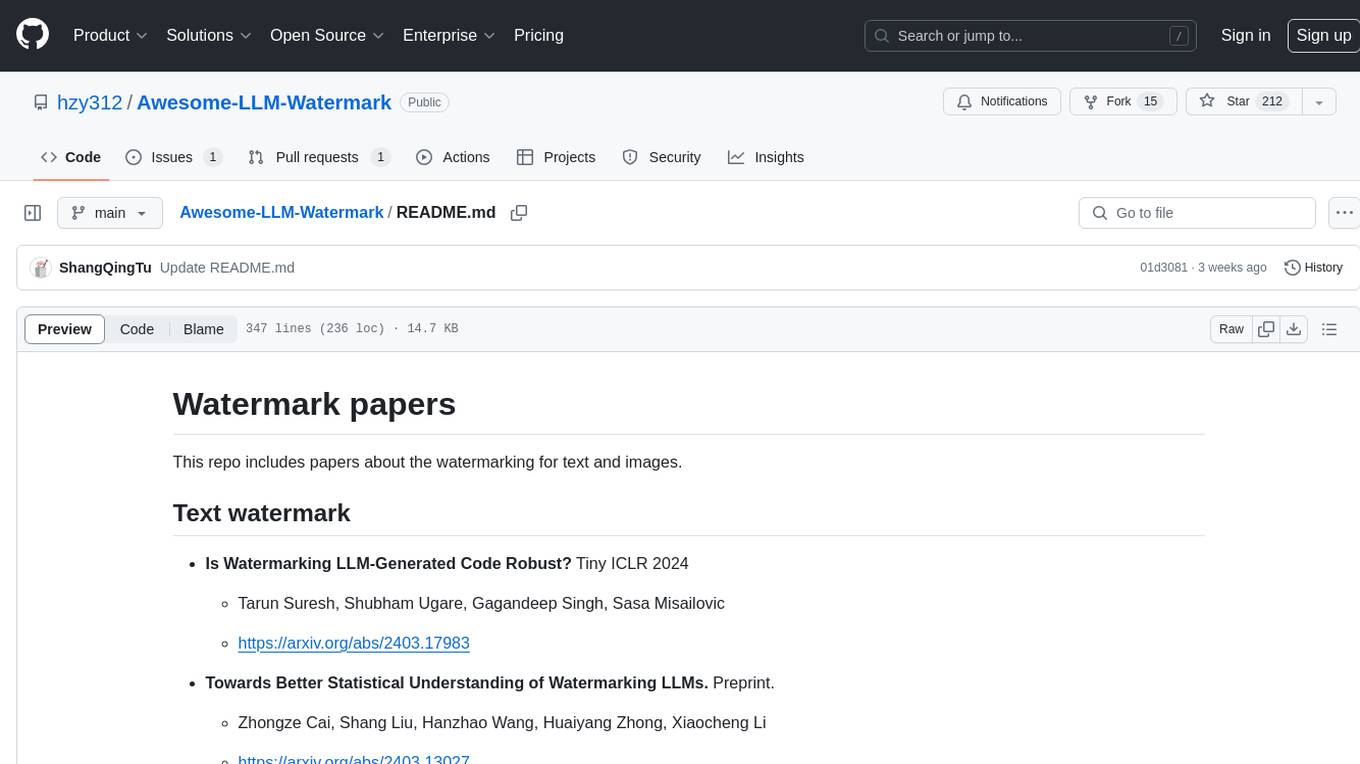
Awesome-LLM-Watermark
This repository contains a collection of research papers related to watermarking techniques for text and images, specifically focusing on large language models (LLMs). The papers cover various aspects of watermarking LLM-generated content, including robustness, statistical understanding, topic-based watermarks, quality-detection trade-offs, dual watermarks, watermark collision, and more. Researchers have explored different methods and frameworks for watermarking LLMs to protect intellectual property, detect machine-generated text, improve generation quality, and evaluate watermarking techniques. The repository serves as a valuable resource for those interested in the field of watermarking for LLMs.
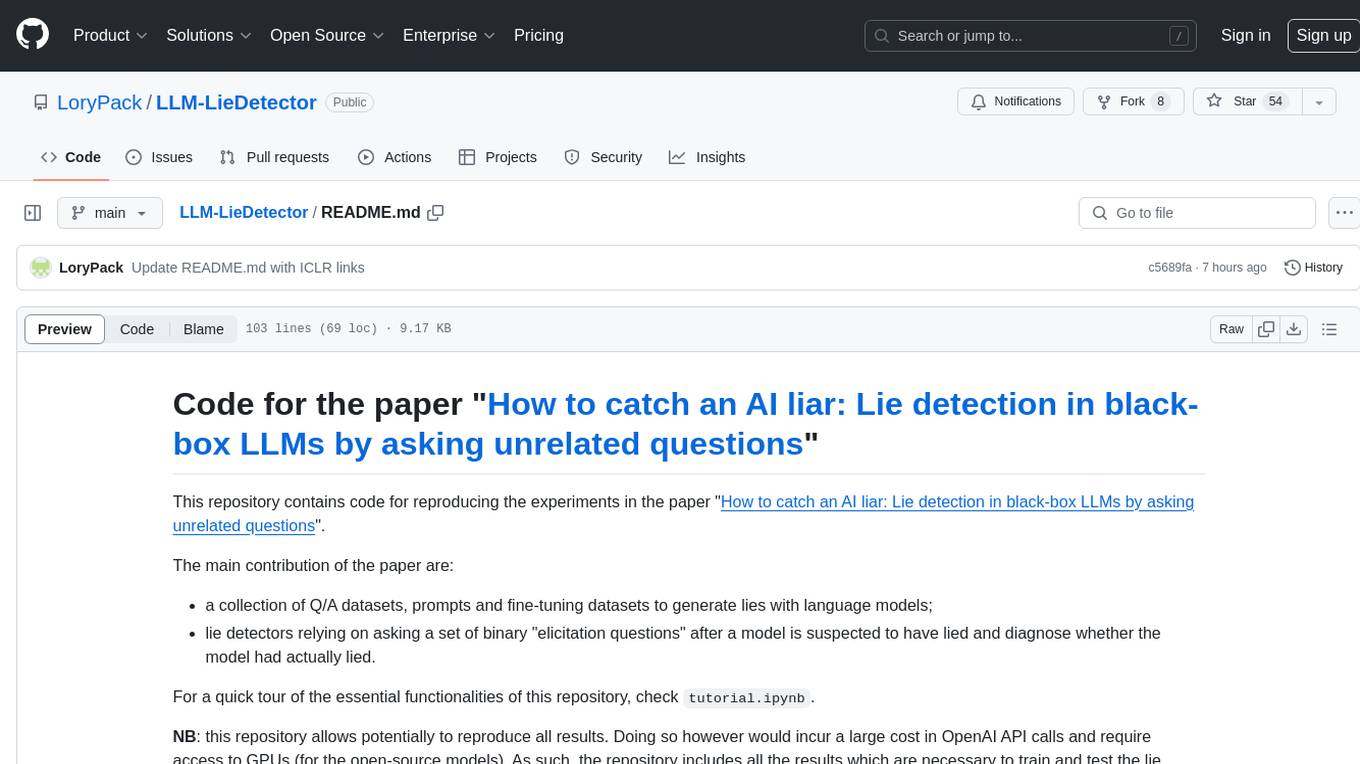
LLM-LieDetector
This repository contains code for reproducing experiments on lie detection in black-box LLMs by asking unrelated questions. It includes Q/A datasets, prompts, and fine-tuning datasets for generating lies with language models. The lie detectors rely on asking binary 'elicitation questions' to diagnose whether the model has lied. The code covers generating lies from language models, training and testing lie detectors, and generalization experiments. It requires access to GPUs and OpenAI API calls for running experiments with open-source models. Results are stored in the repository for reproducibility.
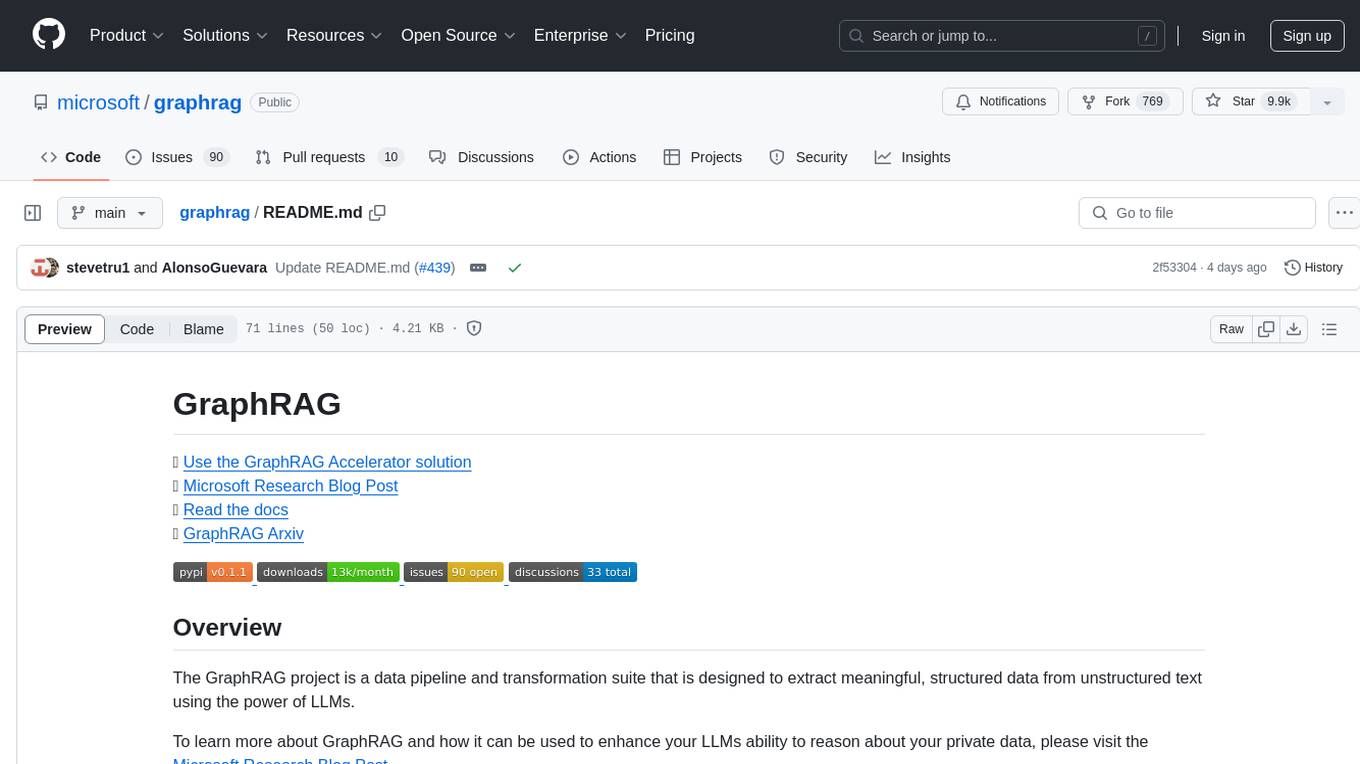
graphrag
The GraphRAG project is a data pipeline and transformation suite designed to extract meaningful, structured data from unstructured text using LLMs. It enhances LLMs' ability to reason about private data. The repository provides guidance on using knowledge graph memory structures to enhance LLM outputs, with a warning about the potential costs of GraphRAG indexing. It offers contribution guidelines, development resources, and encourages prompt tuning for optimal results. The Responsible AI FAQ addresses GraphRAG's capabilities, intended uses, evaluation metrics, limitations, and operational factors for effective and responsible use.
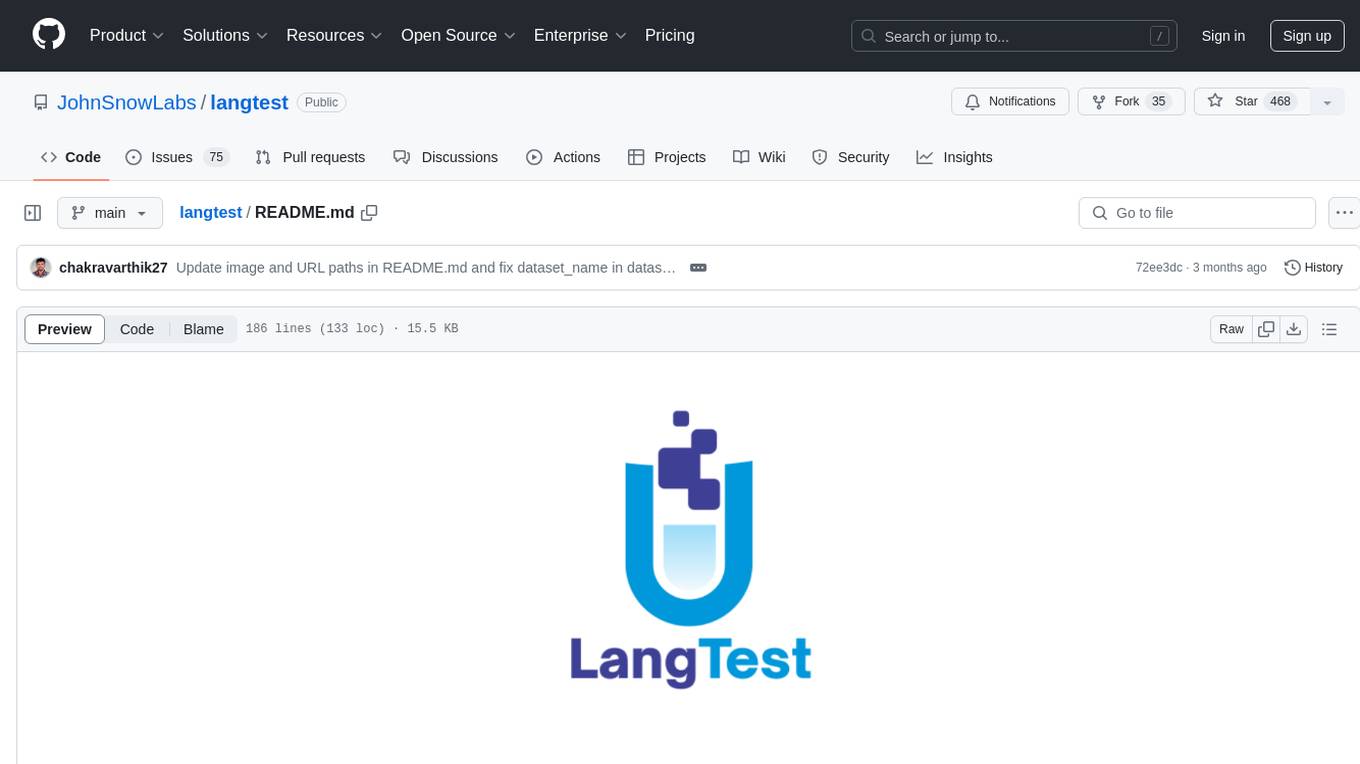
langtest
LangTest is a comprehensive evaluation library for custom LLM and NLP models. It aims to deliver safe and effective language models by providing tools to test model quality, augment training data, and support popular NLP frameworks. LangTest comes with benchmark datasets to challenge and enhance language models, ensuring peak performance in various linguistic tasks. The tool offers more than 60 distinct types of tests with just one line of code, covering aspects like robustness, bias, representation, fairness, and accuracy. It supports testing LLMS for question answering, toxicity, clinical tests, legal support, factuality, sycophancy, and summarization.
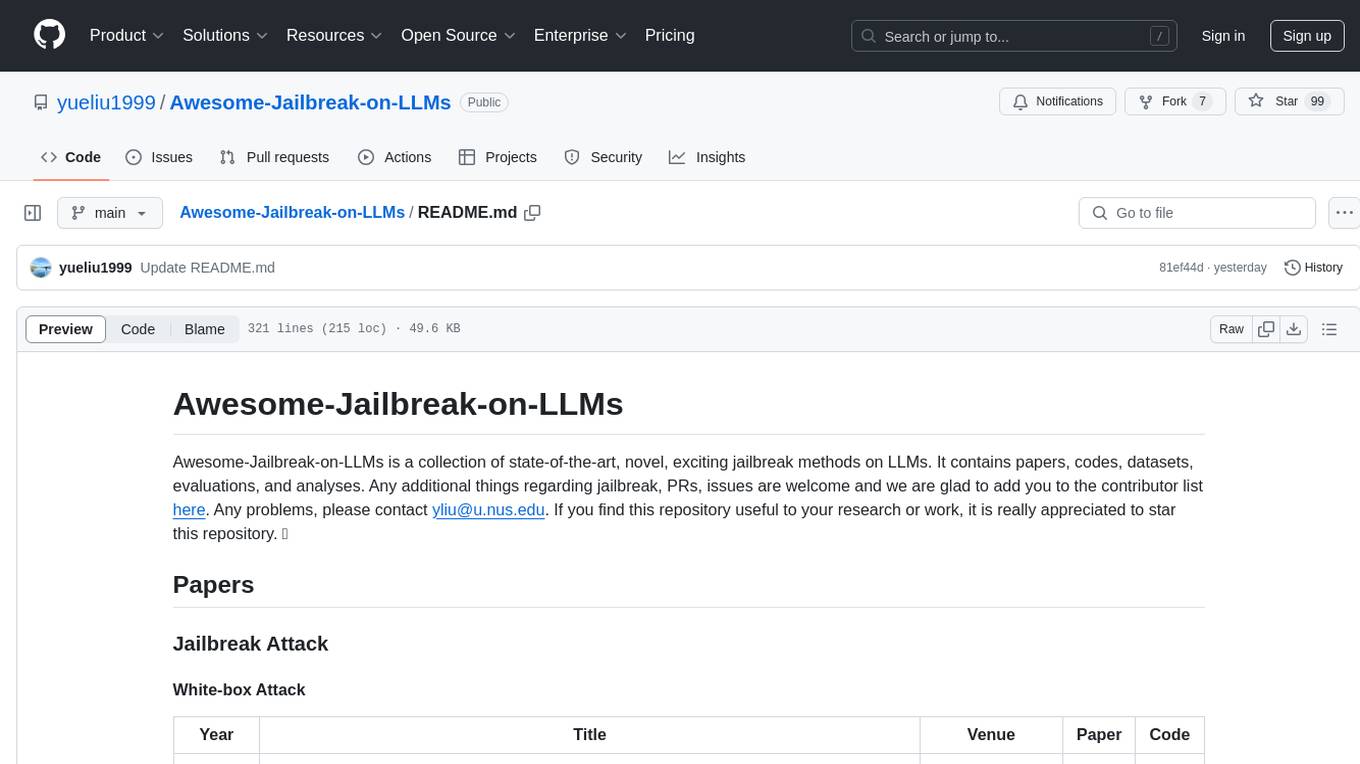
Awesome-Jailbreak-on-LLMs
Awesome-Jailbreak-on-LLMs is a collection of state-of-the-art, novel, and exciting jailbreak methods on Large Language Models (LLMs). The repository contains papers, codes, datasets, evaluations, and analyses related to jailbreak attacks on LLMs. It serves as a comprehensive resource for researchers and practitioners interested in exploring various jailbreak techniques and defenses in the context of LLMs. Contributions such as additional jailbreak-related content, pull requests, and issue reports are welcome, and contributors are acknowledged. For any inquiries or issues, contact [email protected]. If you find this repository useful for your research or work, consider starring it to show appreciation.




